Joan is better at diplomacy, so hopefully he will appease the tensions (and before, the regency) and be the right man to peacefully dissolve the coalition. Switzerland was a surprising heir to the imperial lands of Burgundy, but France is more concerning for you, as they are strengthened by that.
Merchant Kings of Aragon - An EUIV and MEIOU & Taxes AAR
- Thread starter Marco Oliverio
- Start date
-
We have updated our Community Code of Conduct. Please read through the new rules for the forum that are an integral part of Paradox Interactive’s User Agreement.
You are using an out of date browser. It may not display this or other websites correctly.
You should upgrade or use an alternative browser.
You should upgrade or use an alternative browser.
Another good entry, and I'm looking forward to the next one.
I have to say, it's quite worrying to know that England has already started exploring the New World. I honestly have to wonder if they have the colonial range required to begin colonizing Canada / Eastern America. What sort of ideas does England have? Do you know if Portugal has started to explore South America and Africa yet?
Also, in an unrelated note, do you have any thoughts on the stuff that's going to be coming along with the next update, whenever that may be?
I have to say, it's quite worrying to know that England has already started exploring the New World. I honestly have to wonder if they have the colonial range required to begin colonizing Canada / Eastern America. What sort of ideas does England have? Do you know if Portugal has started to explore South America and Africa yet?
Also, in an unrelated note, do you have any thoughts on the stuff that's going to be coming along with the next update, whenever that may be?
@loup99 - Yes, France is worrying. And, as you'll see, a peculiar type of insanity swept parts of southern France in the next little while, and small OPMs declared war on France one by one. You can imagine what happened..... 
Thanks @TheDenzian! I felt the same.
I don't want to spoil the fun, so I have to withhold the answer to your question. But I will say this - some expected things happen, some unexpected things happen, and some very surprising things happen. But these are still a reign or two away.
I was stupid, and got to Diplomacy 18 and clicked the little box Enable the Age of Exploration (or whatever it was called), but TOTALLY FORGOT that I had to also pick Naval Ideas to have Exploration ideas even show up, much less have the option to choose it! So.....I think my story will be (and my strategy actually is) focused on expanding trade control and wealth in the Mediterranean and the Iberian trade centers for a while (making lemonade out of lemons), and then all those interesting things I mention play into the story, and my eventually maniacal focus on Admin Points pay off and we get to hire a conquistador! But that's a few reigns from now...
And (a little teeny spoiler), to answer another of your questions, at this point in the game I did not know the status of Portugal in the New World or Africa. All a mystery. Although they did encourage my protectorate (the Canaries) to revolt away from me, and then picked them up as vassals (after all I'd done for those ungrateful wretches in those islands), so when that happened I figured Portugal was up to something. There is a nice Portuguese surprise in the next update or two.
Speaking of which - I'm on vacation for the next two weeks so I won't be able to update for that long. But mid-May I'll be back, and updating. Don't lose interest, please!
Thanks @TheDenzian! I felt the same.
I don't want to spoil the fun, so I have to withhold the answer to your question. But I will say this - some expected things happen, some unexpected things happen, and some very surprising things happen. But these are still a reign or two away.
I was stupid, and got to Diplomacy 18 and clicked the little box Enable the Age of Exploration (or whatever it was called), but TOTALLY FORGOT that I had to also pick Naval Ideas to have Exploration ideas even show up, much less have the option to choose it! So.....I think my story will be (and my strategy actually is) focused on expanding trade control and wealth in the Mediterranean and the Iberian trade centers for a while (making lemonade out of lemons), and then all those interesting things I mention play into the story, and my eventually maniacal focus on Admin Points pay off and we get to hire a conquistador! But that's a few reigns from now...
And (a little teeny spoiler), to answer another of your questions, at this point in the game I did not know the status of Portugal in the New World or Africa. All a mystery. Although they did encourage my protectorate (the Canaries) to revolt away from me, and then picked them up as vassals (after all I'd done for those ungrateful wretches in those islands), so when that happened I figured Portugal was up to something. There is a nice Portuguese surprise in the next update or two.
Speaking of which - I'm on vacation for the next two weeks so I won't be able to update for that long. But mid-May I'll be back, and updating. Don't lose interest, please!
Sounds like there'll be quite a few interesting updates coming out mid-May, although I wish that I didn't have to wait that long to see them. I'll definitely keep an eye on this story while awaiting your return. At least it'll be one less thing to distract me during exams.
That mistake in regards to picking up Exploration ideas sounds like it might have stung a bit. Hopefully everything comes out fine. At the very least, there's a fair bit of evidence that the AI is terrible at colonizing in M&T, so there's a chance you'll have a mostly virgin New World to exploit and get rich off of.
That mistake in regards to picking up Exploration ideas sounds like it might have stung a bit. Hopefully everything comes out fine. At the very least, there's a fair bit of evidence that the AI is terrible at colonizing in M&T, so there's a chance you'll have a mostly virgin New World to exploit and get rich off of.
Hi @DKM. Welcome, and thanks! I could do that, but I haven't for a few reasons:
- Galicia will be weak if released.
- Portugal or Leon might be hungry.
- I want to try to keep some sort of balance between the Iberian powers.
- I'm not interested in eventually vassalizing / absorbing Galicia, so it just makes for a nice way to periodically defeat Castile!
One more small posting before I leave on vacation.
~~~~~
The Regency Council for Joan II
The short period of Regency rule for Joan II (just three years) can be seen as a continuation of the policies and practices of the reign of Marti. Advisors were kept in place, national strategies remained unchanged, and diplomatic engagements followed the same general contours.
Just prior to Marti’s death, Leon had declared war on Castile for the province of Soria. Aragon for the first time was alarmed at the ambitions and appetite of Leon - the acquisition of border provinces in previous years had caused some consternation, but they were far from the heartland of Aragon, and the alliance was strong. But this time the reaction in Aragon was more muted - Soria was the pathway to the heart of Aragon proper, and had long been eyed by the Crown of Aragon as a natural part of Aragon. The only reason it had not yet been acquired in war was that it was so obviously part of Aragon’s claims there was no need. Or so it was felt.
One additional shock to the Court in Barcelona arrived with the news that Portugal was joining the war on the side of Castile. If it had been a war between Leon and Castile, and the focus had been anything other than Soria, Aragon might have stood aside and let the two smallest states fight for the prize. But Soria could not fall into the hands of any state other than Aragon, and Portugal could not be allowed to upset the fragile balance of power among the Christian states. And so the Leonese declaration of war galvanized the Regency Council - mourning for Marti was over and the country was put on war footing.
The military gave two instructions to get to the commanders in the field:
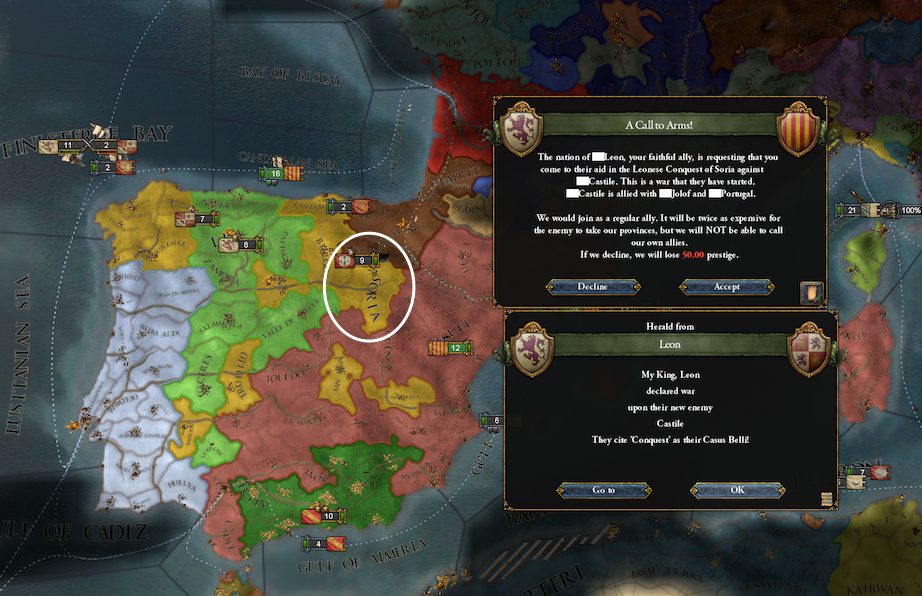
The Aragonese military machine happily obliged.
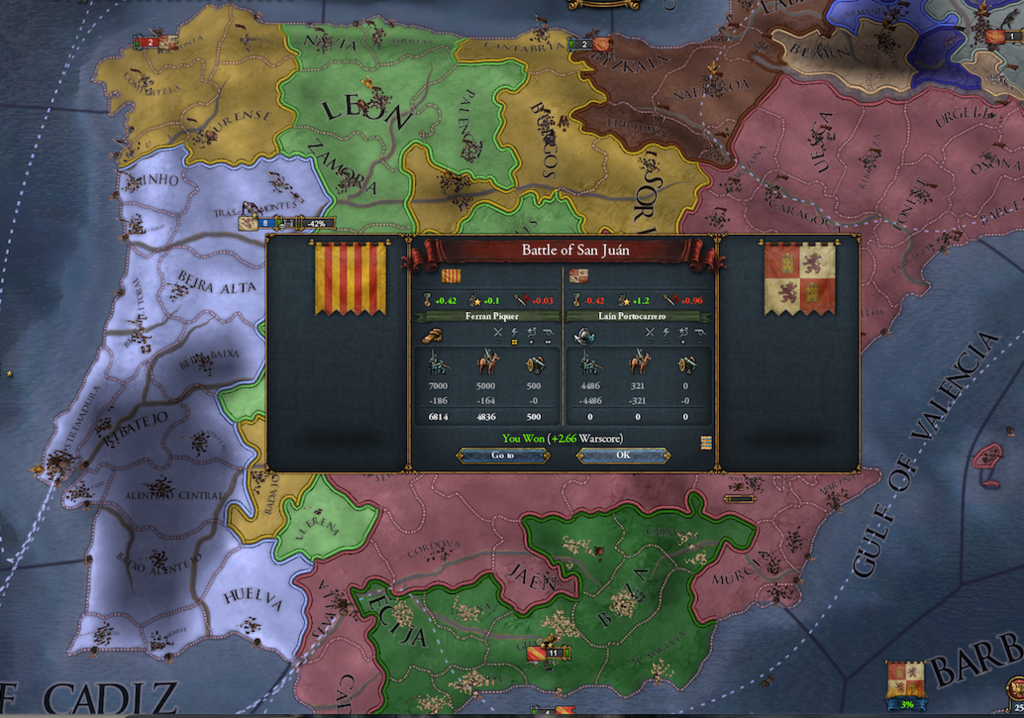
Over a series of engagements across the length and breadth of Castile’s Iberian provinces, Aragon met and defeated the few forces that Castile was able to bring to bear against the onslaught.
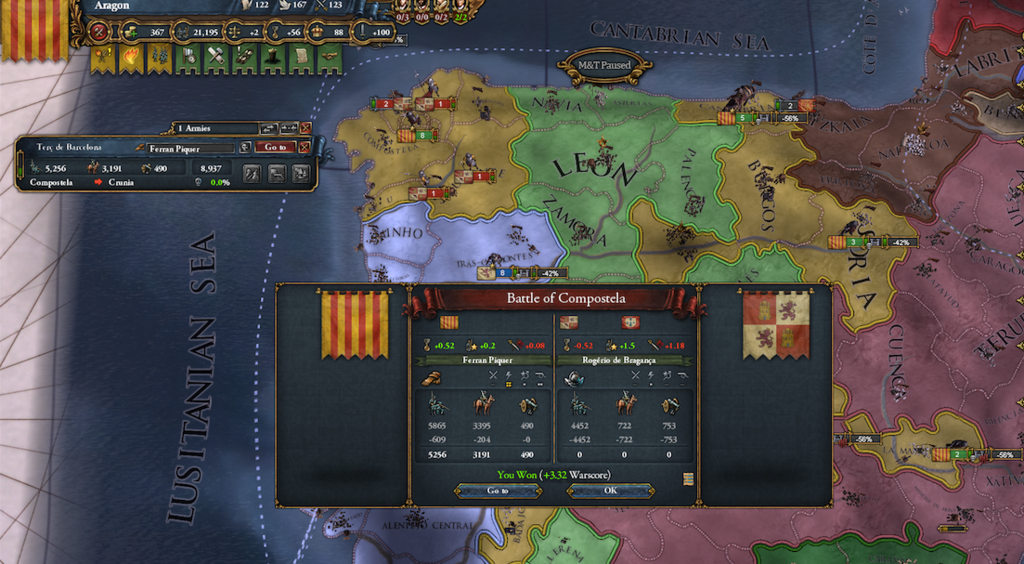
Castile’s provinces were also put under siege.
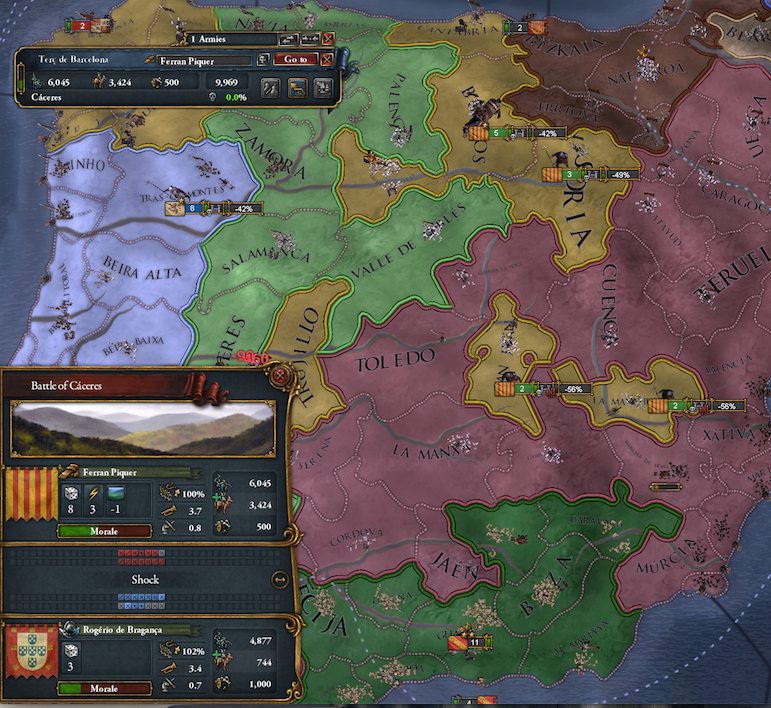
By 1476, the final two battles of the war were fought. With this defeat all of Castile’s forces were destroyed and her provinces under siege, or shortly to be so. Aragon settled in to bring Castile to its knees.
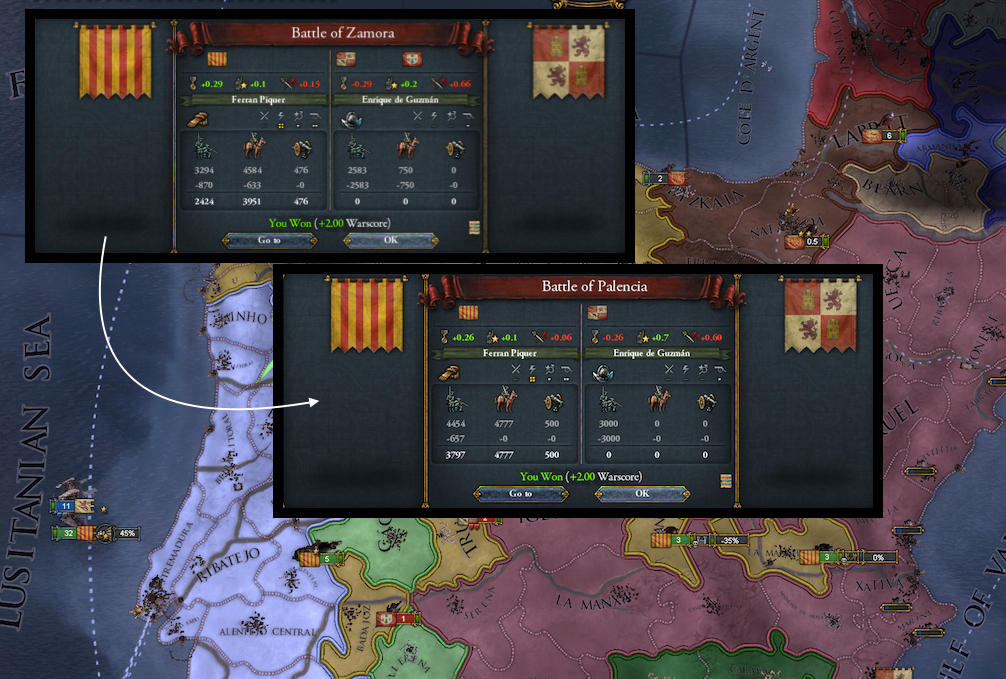
During the war, the Regency Council continued the other policies of Marti - including the welcoming of refugees of all religions. In stark contrast to that, the Emir in Granada continued his fanatical suppression of all religions other than Sunni Islam. Jewish refugees streamed in to Mucia and Seville for several years in a row. They are boon the the populations of several Aragonese provinces, and brought connections, knowledge and wealth to the Crown.
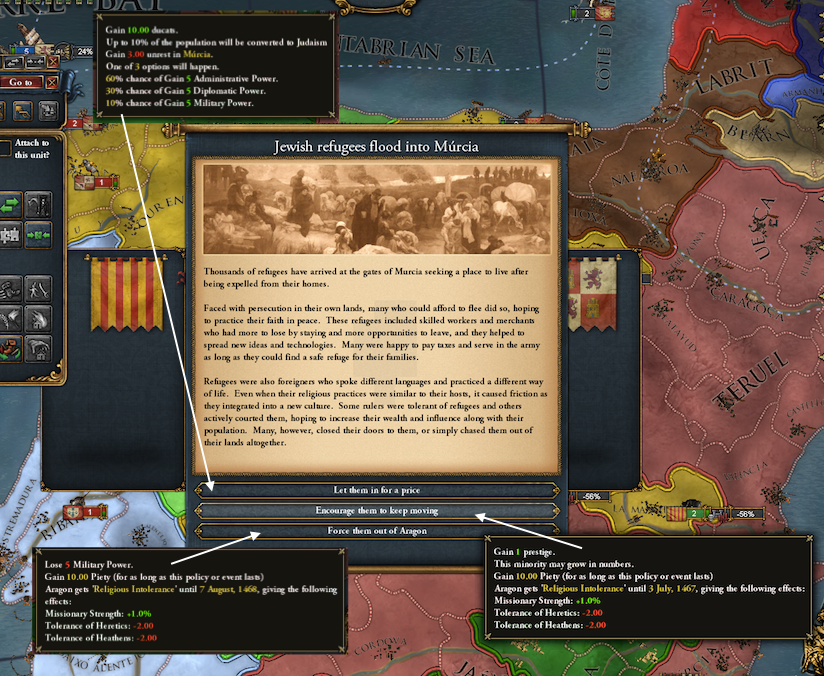
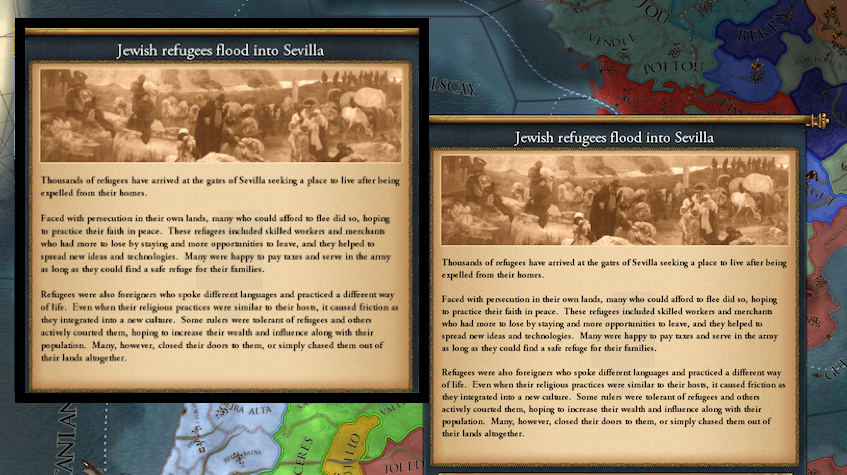
France, the rising power of Middle Europe, continued its policies of aggression and growth in hopes of resurrecting its power. As part of this strategy, and acknowledging the rising power of Aragon in what it considered its sphere of influence, joined the Grand Coalition against the Crown of Aragon.
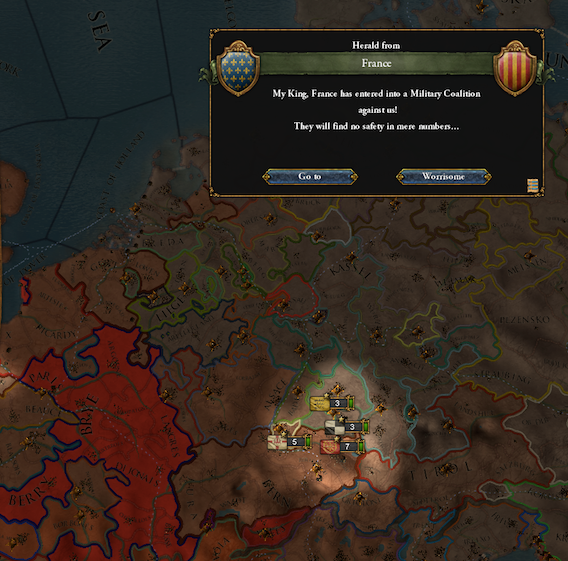
France also insulted and threatened the small duchy of Bourbonnais until the Duke felt he no option but to declare war on France. How the Duke thought he would survive is a total mystery to us to this day.
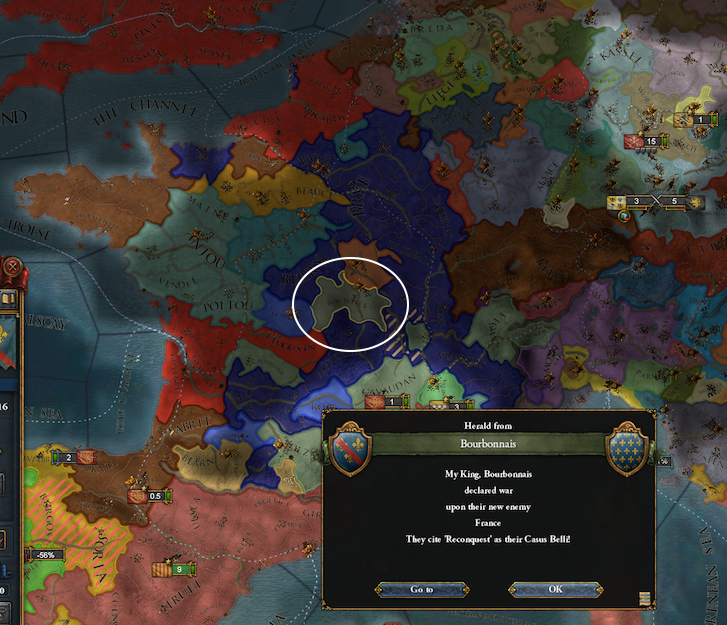
As the news of the impossible war against France reached the Court, Joan reached his maturity and ascended the throne as Joan II.
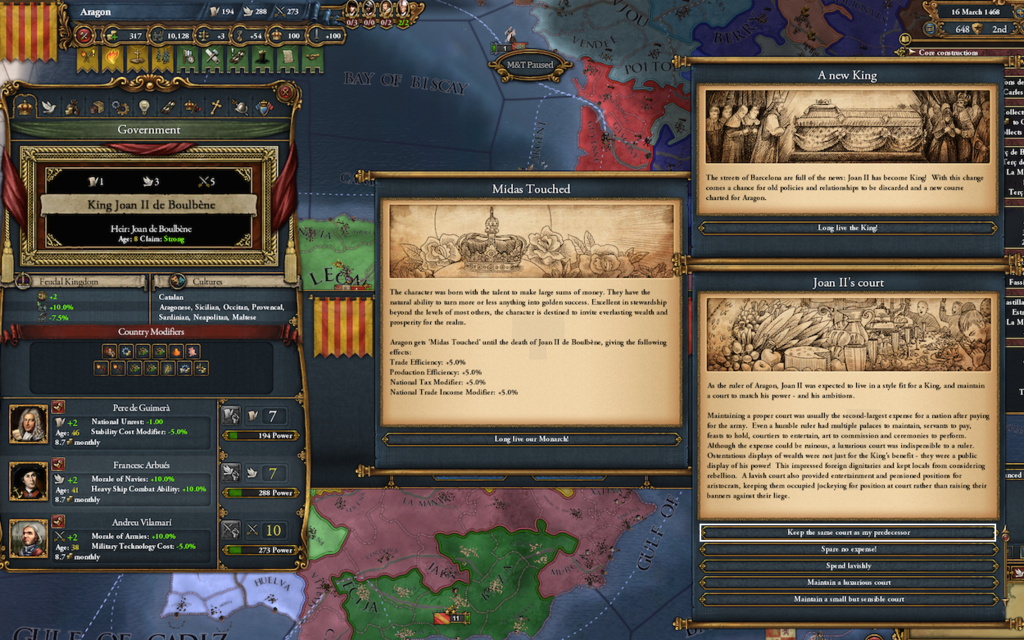
For the first time in many reigns, Aragon was to be ruled by a Merchant King.
~~~~~
The Regency Council for Joan II
The short period of Regency rule for Joan II (just three years) can be seen as a continuation of the policies and practices of the reign of Marti. Advisors were kept in place, national strategies remained unchanged, and diplomatic engagements followed the same general contours.
Just prior to Marti’s death, Leon had declared war on Castile for the province of Soria. Aragon for the first time was alarmed at the ambitions and appetite of Leon - the acquisition of border provinces in previous years had caused some consternation, but they were far from the heartland of Aragon, and the alliance was strong. But this time the reaction in Aragon was more muted - Soria was the pathway to the heart of Aragon proper, and had long been eyed by the Crown of Aragon as a natural part of Aragon. The only reason it had not yet been acquired in war was that it was so obviously part of Aragon’s claims there was no need. Or so it was felt.
One additional shock to the Court in Barcelona arrived with the news that Portugal was joining the war on the side of Castile. If it had been a war between Leon and Castile, and the focus had been anything other than Soria, Aragon might have stood aside and let the two smallest states fight for the prize. But Soria could not fall into the hands of any state other than Aragon, and Portugal could not be allowed to upset the fragile balance of power among the Christian states. And so the Leonese declaration of war galvanized the Regency Council - mourning for Marti was over and the country was put on war footing.
The military gave two instructions to get to the commanders in the field:
- The armies of Aragon were to reach Soria before the forces of Leon could arrive there. Under no circumstance was Soria to fall to Leon.
- The armies of Portugal and her territory were to be avoided at all cost unless they were the obstacle to capturing Soria. The Regency Council had hope that the alliance with Portugal could be recovered once this war was over if Portugal was given no reason to gain enmity against the Crown.

The Aragonese military machine happily obliged.

Over a series of engagements across the length and breadth of Castile’s Iberian provinces, Aragon met and defeated the few forces that Castile was able to bring to bear against the onslaught.

Castile’s provinces were also put under siege.

By 1476, the final two battles of the war were fought. With this defeat all of Castile’s forces were destroyed and her provinces under siege, or shortly to be so. Aragon settled in to bring Castile to its knees.

During the war, the Regency Council continued the other policies of Marti - including the welcoming of refugees of all religions. In stark contrast to that, the Emir in Granada continued his fanatical suppression of all religions other than Sunni Islam. Jewish refugees streamed in to Mucia and Seville for several years in a row. They are boon the the populations of several Aragonese provinces, and brought connections, knowledge and wealth to the Crown.


France, the rising power of Middle Europe, continued its policies of aggression and growth in hopes of resurrecting its power. As part of this strategy, and acknowledging the rising power of Aragon in what it considered its sphere of influence, joined the Grand Coalition against the Crown of Aragon.

France also insulted and threatened the small duchy of Bourbonnais until the Duke felt he no option but to declare war on France. How the Duke thought he would survive is a total mystery to us to this day.

As the news of the impossible war against France reached the Court, Joan reached his maturity and ascended the throne as Joan II.

For the first time in many reigns, Aragon was to be ruled by a Merchant King.
Is Navarra even a player in Iberian politics?
They will try to make a big splash farther north....just you wait! But they have been very very helpful in all of Aragon's wars in Iberia. A very reliable ally - Aragon has ensured that provinces go to Navarra in some of the wars. They are very appreciative...
There is indeed a fragile balance on the Peninsula. I'm afraid that once Castille/Granada are out of the picture, the other powers will turn against you, leaving the possibility France will exploit the situation. Although France is a bit more weak in MEIOU & Taxes, so I might be overestimating them.
On a completely different note, I have seen that you seem to be having some GFX issues. Do you have any idea what could be causing it? MEIOU & Taxes has a lot of different modules for DLC, some of which might cause these kind of issues.
On a completely different note, I have seen that you seem to be having some GFX issues. Do you have any idea what could be causing it? MEIOU & Taxes has a lot of different modules for DLC, some of which might cause these kind of issues.
~~~~~
The Early Years of Joan II
The accession of Joan II to the throne unleashed an outpouring of economic and domestic harmony. The merchants, the nobles across the various kingdoms of the Crown of Aragon, townspeople and peasants all welcomed their handsome and charismatic new young king. Among those welcoming the new king with vows of loyalty and obeisance were the rules and peoples of the provinces of Toledo and Montpelsier - the latter province won from Toulouse not that many years before.
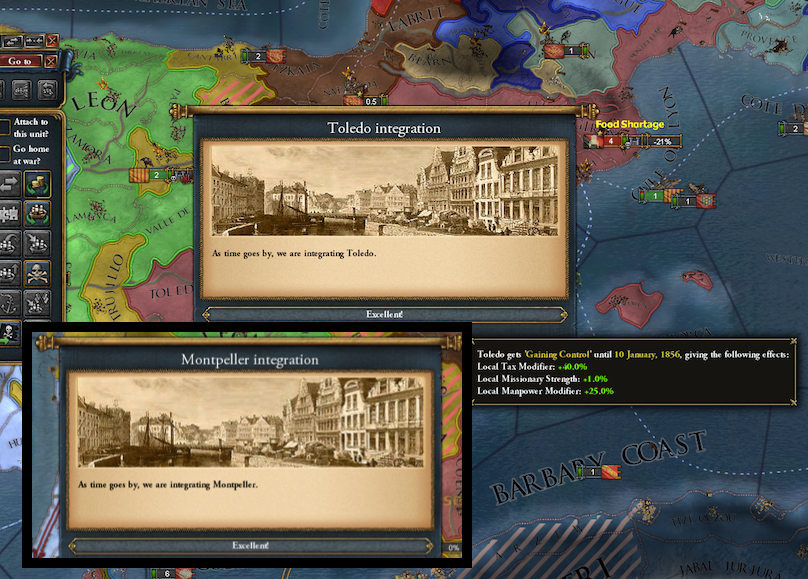
The traders and diplomats of Aragon also brought the first whispers of lands beyond the Atlas Mountains. Control of the trading cities along the African coast were bringing not only wealth to the Crown, but were springboards for the acquisition of new knowledge about what lay beyond the lands of Fez, Morocco and Tlemcen.
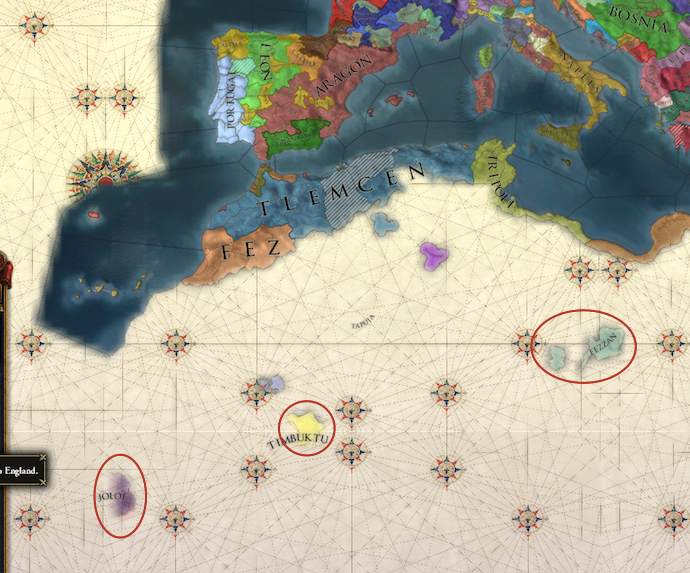
While Joan directed domestic investments in roads, ports, garrisons and various government buildings throughout his domains, the court in Barcelona watched as Leon slowly conquered the lands of Castile while holding off the power of Portugal. In 1470, Leon was able to force Castile to the treaty table. In a move that surprised Aragon, relieved Castile and embittered Portugal, Leon demanded the county of Beira Baixa in return for peace. Castile was happy to oblige, offering its ally's province for peace. To this day, scholars and historians are divided on this choice - the Leonese could have gained the rich silver mines of Badajoz, or the province of Burgos (as a way to cut off Madrid from the rest of Castile’s lands, or demanded the independence of the Kingdom of Galicia. All of these choices (and countless others) could have further weakened Castile and materially strengthened Leon. Instead, it gained a province that was not core to the power of Leon and gained the enmity of the King in Lisboa. This decision would prove to be the beginning of a turning point in the history of Iberia, as we will see.
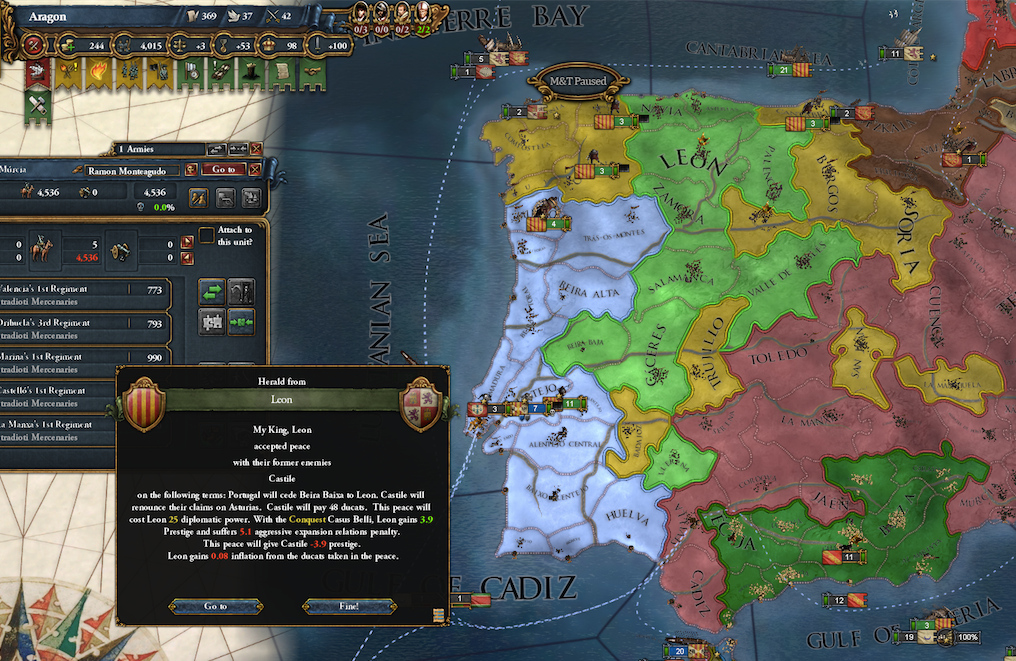
The years of focus on internal development and external peace initiated by the Regency Council and continued in the early years of Joan’s reign also saw the Grand Coalition against Aragon begin to crumble, with the Florentines being the first to set aside their distrust of the Crown.
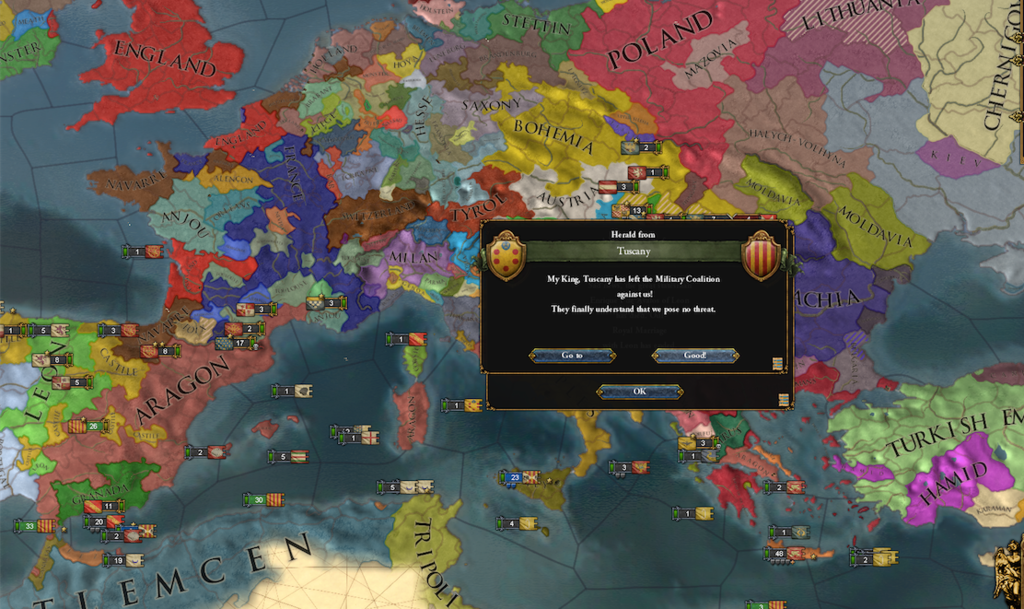
In 1475, the event the Crown of Aragon had worked assiduously to create finally become a reality - the Duke of Anjou declared independence from his overload, the King of France, and called Aragon to war.
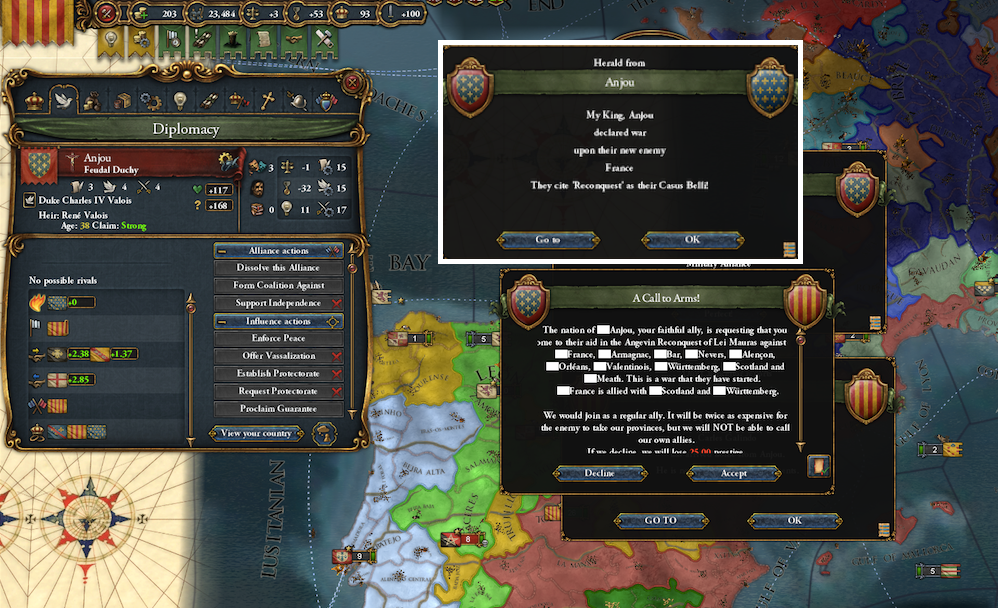
The Duke was one of the most significant vassals of France, and had long supported French wars throughout Gaul. In fact, France’s ability to spring back from defeat after defeat was the extensive number of vassals she held in thrall to herself. They all tended to reply to their mistress's calls to war, and would quickly bring their armies to bear in any war. Consequently, the diplomats of Aragon had long realized that neutralizing France required the breaking of the bonds of vassalage she held over the various duchies and counties of Gaul. Anjou would prove to the first of those efforts.
The war would be fought on two fronts - in the north, Anjou would France and her vassals; in the south, Aragon would join with the Angevins from Provencal to take on France. As both sides attempted to bring their major forces together, small skirmishes were fought throughout the countryside. But both sides managed to meet on the battlefield in Poitou, when the Aragonese forces caught the French who were besieging the city of Poitou.
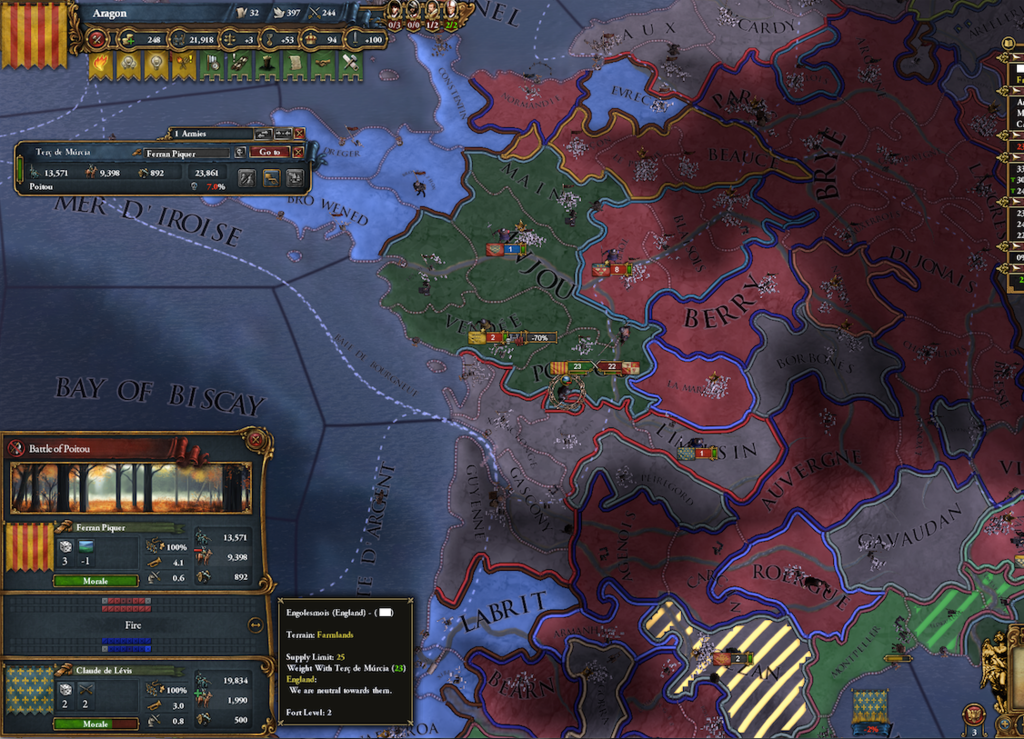
Although the French had more men and an extremely capable commander in the person of Claude de Leon, the superior military training and tactics of Aragon and Anjou carried the day. The French were defeated and forced to flee the battlefield although they also inflicted significant damage to the Aragonese forces. Trailing after the retreating French forces, the armies of Aragon and Anjou once again met and defeated their enemies in Vianneis, although they again suffered significant losses.
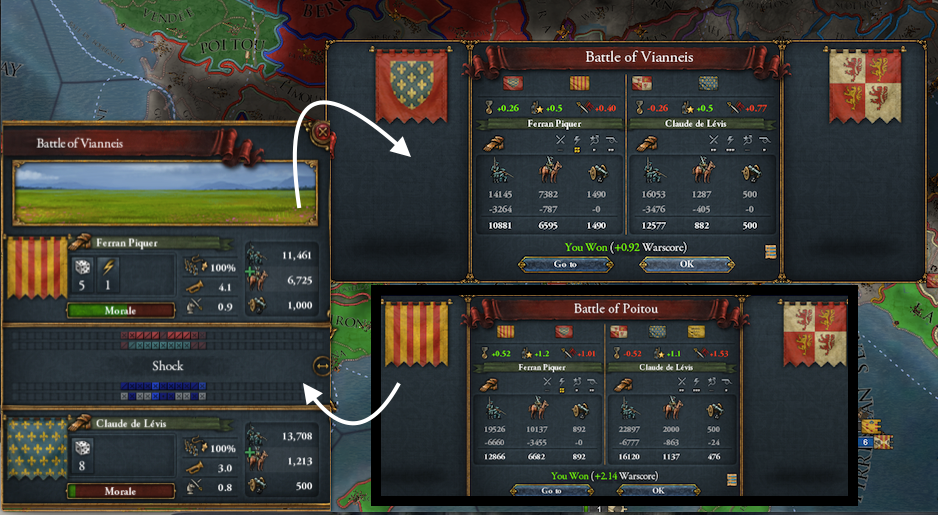
Ferran Piquer, commander of the main Aragonese forces in France at this time, observed an unusual behavior among the French vassals during the Angevin war of independence in a report to Barcelona.
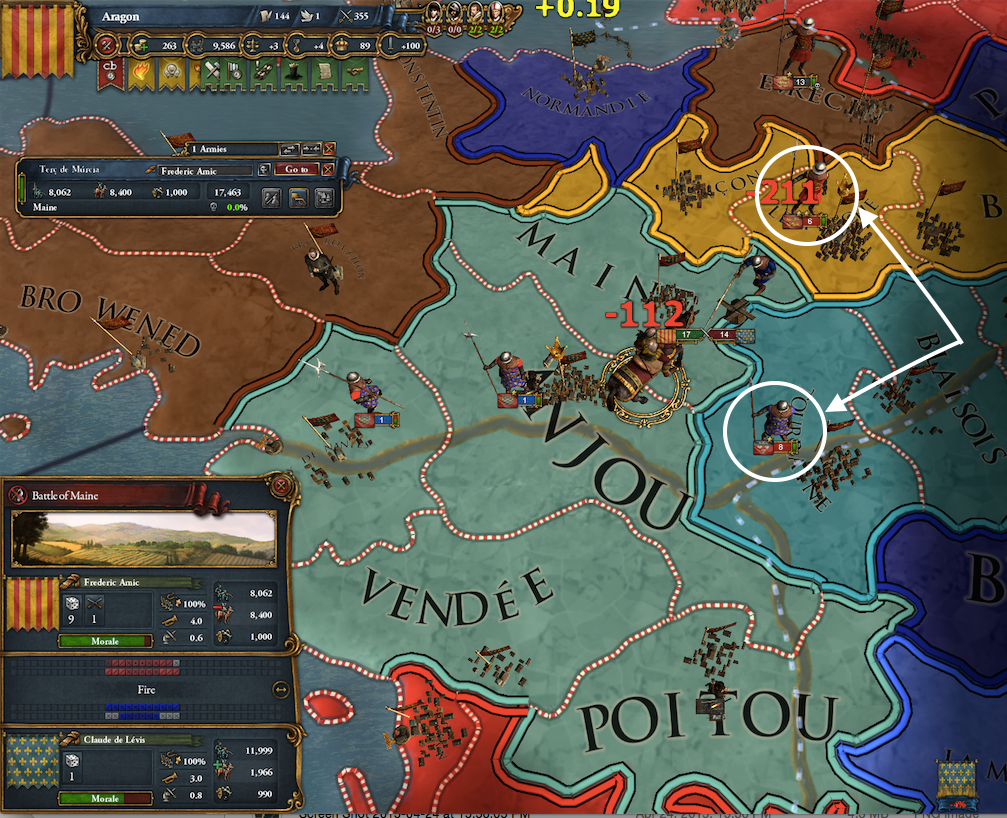
In late 1477, the Swiss, who had inherited the German lands of the old Duke of Burgundy, declared war on France for those possessions of the Duke that France had claimed. With the French armies defeated again and again by Aragon and Anjou, there were none to oppose the advance of the Swiss and her allies. Swiss forces quickly occupied much of France in the north.
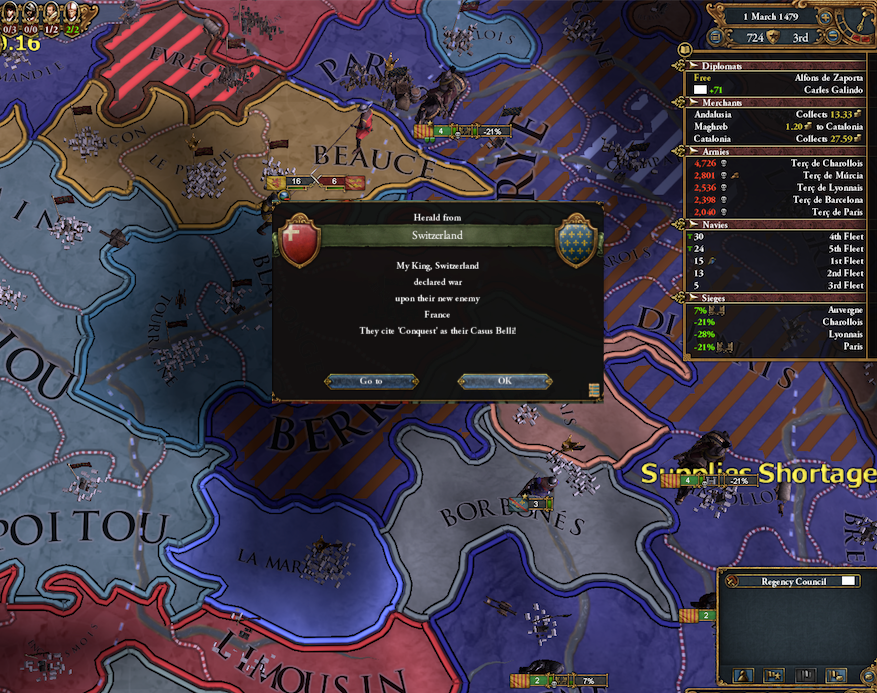
And in this year of French disasters, the final blow was struck by Toulouse. After its last wars with England and France, it had been fractured into a few small provinces scattered across the southern reaches of France. She now sought her revenge, and declared war on an already reeling France. Within the space of a few months, the southern provinces of the King of France were occupied by the armies of Toulouse - a truly stunning return to relevance.
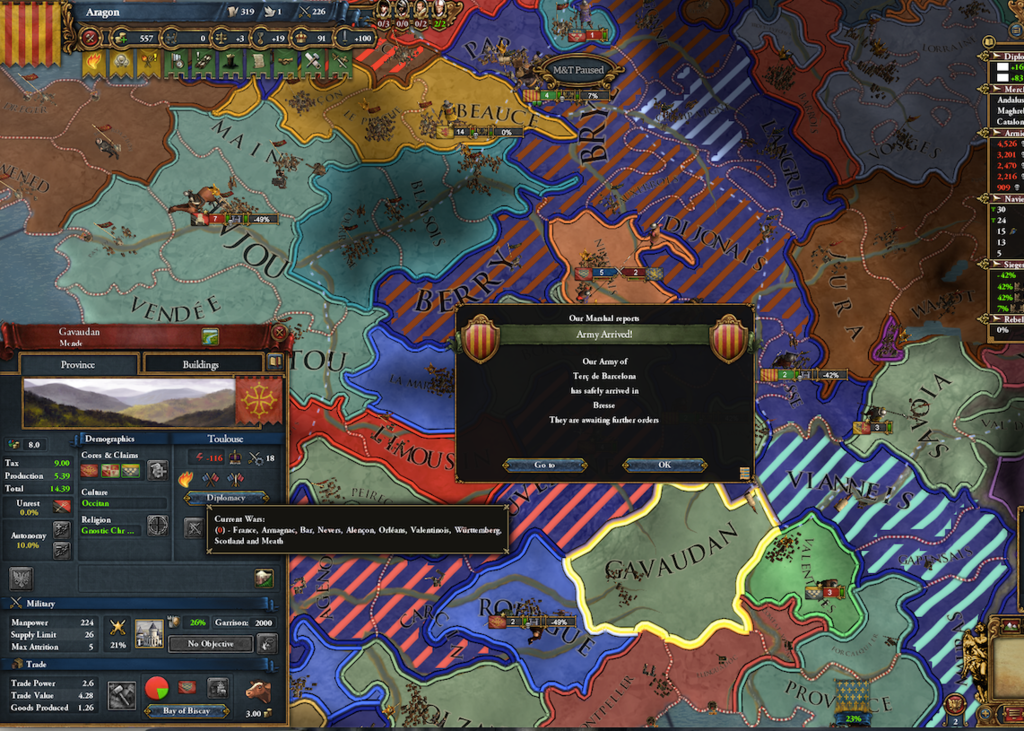
In 1481, with the fall of Paris, the entirety of the Kingdom of France was occupied by one of the three major sets of belligerents - Aragon/Anjou, Toulouse/Geneva, and Switzerland and her German allies. France had gone from resurgent power (conquering most of Toulouse, absorbing nice, putting Bourbonnais and Foix into strong vassalge) and expanding her domain in the south and in the territories of the old Duke of Burgundy to being shown to be nothing more than a paper tiger. In less than three years, all of her armies were defeated and her territories occupied. It was merely a question of which party the French King would negotiate with first.
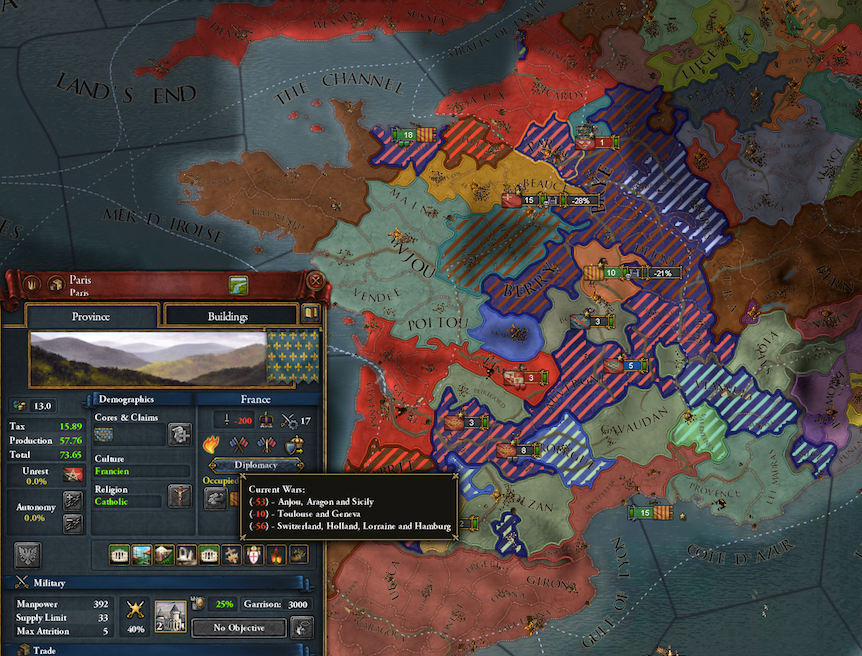
As the Court in Barcelona waited to see which party the French King would approach first, news arrived of the outbreak of war between Portugal and Leon over Beira Baixa. Both sides appealed to Barcelona for aid; both requests were declined. The decision to not support either side stunned supporters of both sides in the Court, countryside, and across Europe. We can imagine the impact on the prestige of the Crown of Aragon. But the King assured his ministers in a council meeting that all would be well. In fact, some of the assurances the king offered can be found in the Royal archives. I’ve included a few extracts here (all attributed to the King, but it’s difficult to be sure given the fragmentary nature of the extracts):
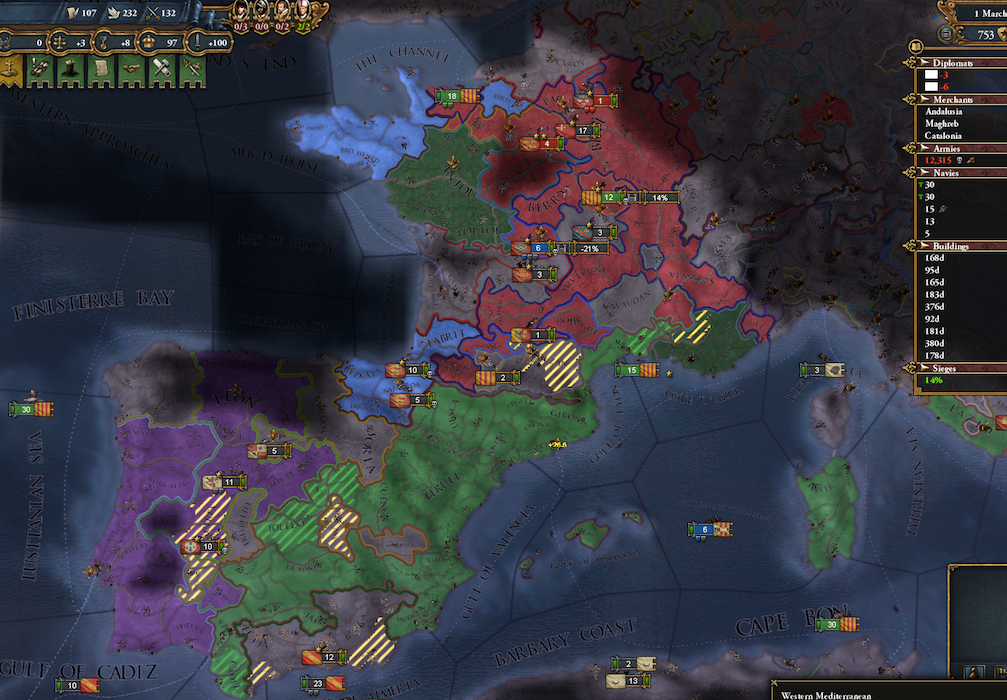
While the assurance of Joan about the prestige of the Crown will be proven over time, those about the outcome of the war between Portugal and Leon will illuminate the inexperience of the king in the diplomatic realm and the the lack of understanding of the true relations between Portugal and Leon at this time. While the king was young and could therefore be excused for not having a strong and nuanced view of the world in these early years, this was surely a failure of the diplomatic service available to the King. That, or the pro-Portuguese party at Court was successful in keeping the true nature of Portugal’s intent from him.
While war raged in Iberia, the King of France came to the peace table and granted independence to his rebellious vassal Anjou. Although the peace the Duke sought was humiliating to Paris, it was merely losing a major vassal and some revenue. No lands under the direct control of France were sought by the Duke or offered by the King - the peace was simple and easily arrived at.
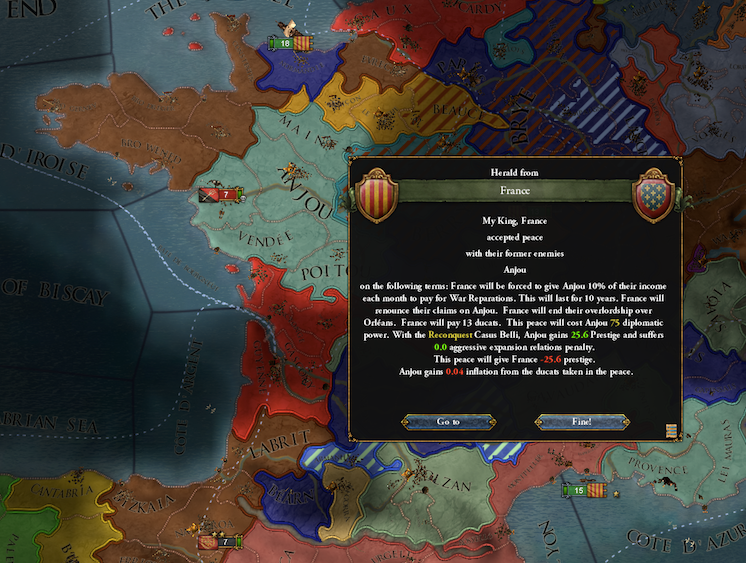
With the Angevin peace established, France was able to bring her remaining vassals into the wars with the Swiss and Toulouse. But it was too little, too late. In the north, the Swiss quickly overran the provinces vacated by the Aragonese and Angevin forces, and defeated the vassals of France who answered the call the war. In the South, the armies of Toulouse did the same.
France next agreed to peace with the Swiss, and granted many cities, town and castles that had once belonged to Burgundy to them. The Swiss also insisted that the county of Champagne be granted to Lorraine, and two of France’s smaller vassals be granted total freedom. Unlike the peace with Anjou, this peace cost the king of France significant lands and money, and significantly reduced (once again) the power of France in the constellation of European powers.
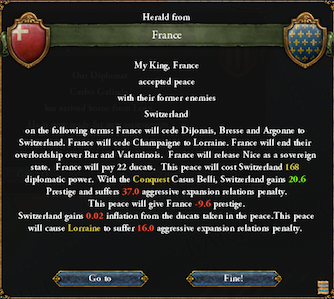
As the Swiss had done before them, Toulouse moved quickly to occupy the places that this latest peace returned to the control of France.
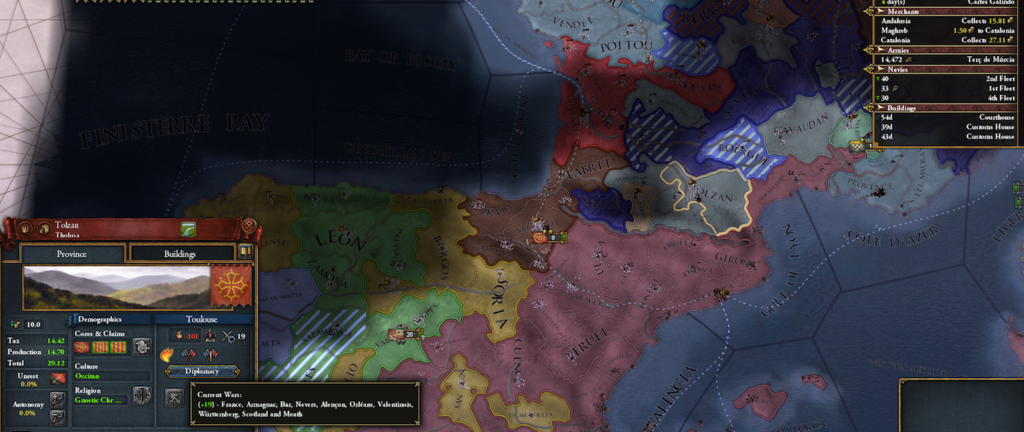
As the war between Portugal and Leon entered it’s third year, Joan’s diplomats in Lisbon succeeded in repairing relations between the two kingdoms, and reinstating the alliance. Joan sent messages attesting to his great love and feelings of brotherhood to the Portuguese king. His diplomats in Leon, however, met with indifference and hostility - the Leonese believed that Joan had abandoned them to their fate in their hour of greatest need. But although their armies were defeated and their territory was beginning to fall, rather than accept the overtures of peace emanating from Barcelona they chose to stand their ground and fight.
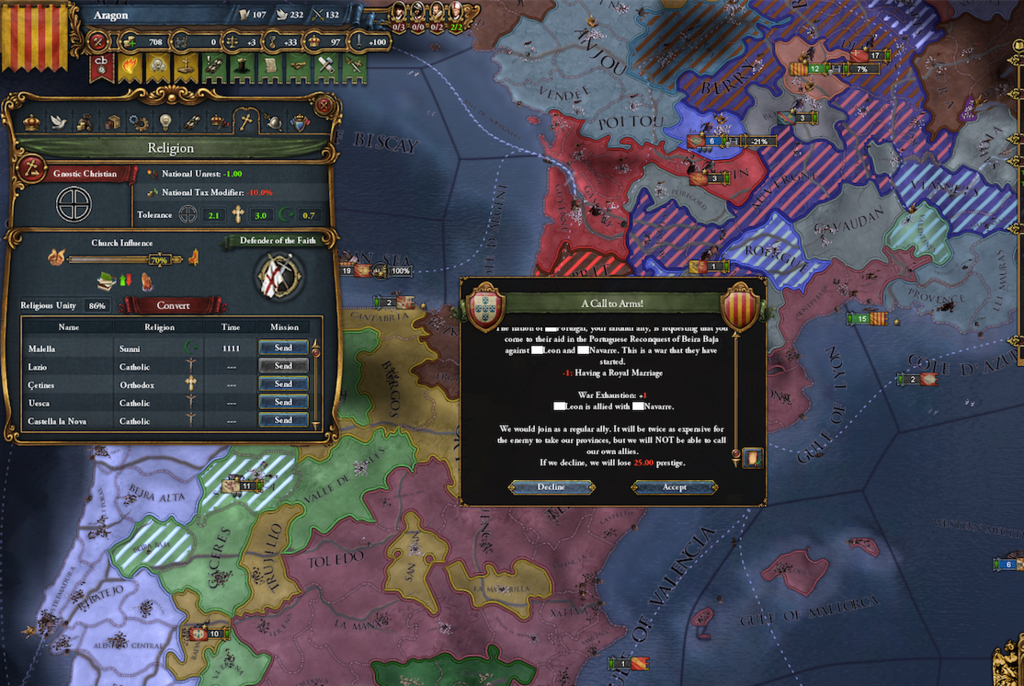
By 1484, Portugal had almost total dominance over Leon, and Joan again offered his services to facilitate peace. Now the Leonese were were willing to accept his offer of mediation, but the Portuguese kept his diplomats in Lisboa while the armies of Portugal completed the occupation of Leon.
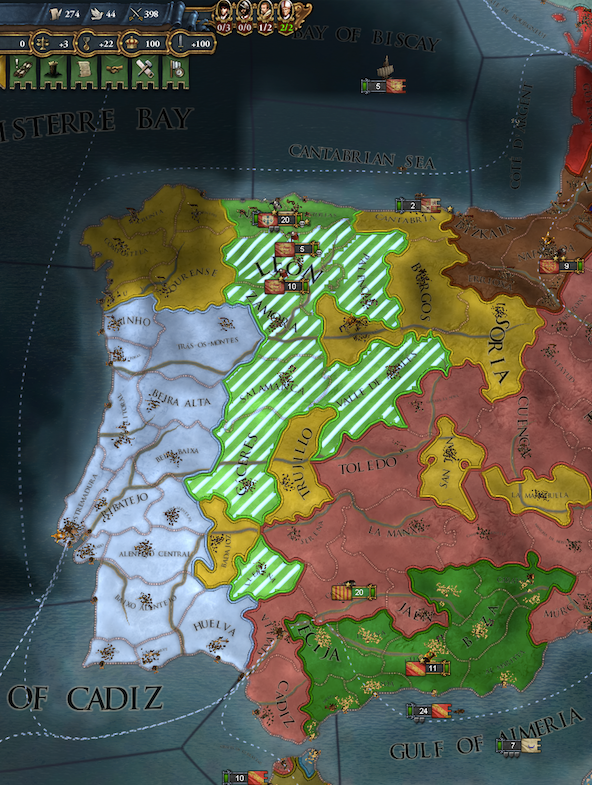
While Joan waited for his offers of mediation to be accepted, he declared war on the Emir of Granada once again. The fanaticism of the rulers of Granada once again drive non-Muslims out of the country and into the cities of Aragon - this time refugees arrived destitute at the gates of Seville in the south.
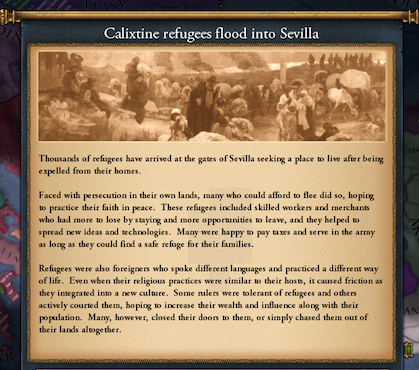
Taking advantage of the despair of the refugees and ongoing reports of continuing oppression of all non-Sunni religious communities across the Emirate, Joan declared war. The armies of Aragon advanced against Granada, quickly defeating the armies of the Emirate and beginning to put her cities and castles under siege.
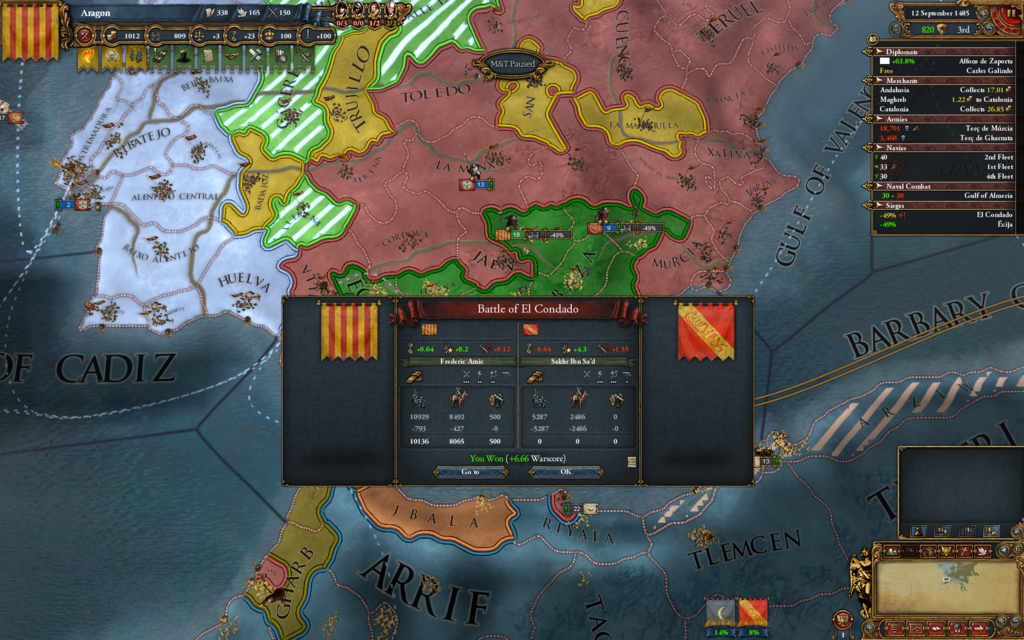
And at this moment, the King of Portugal revealed the extent of his enmity against Leon, and his grand plans to expand his power, territory and influence. Although everyone at the Court in Barcelona, including Joan II, expected Portugal to reclaim Beira Baixa and perhaps the southern provinces of Leon bordering Huelva, Portugal insisted on the complete and unconditional annexation of the entire kingdom of Leon.
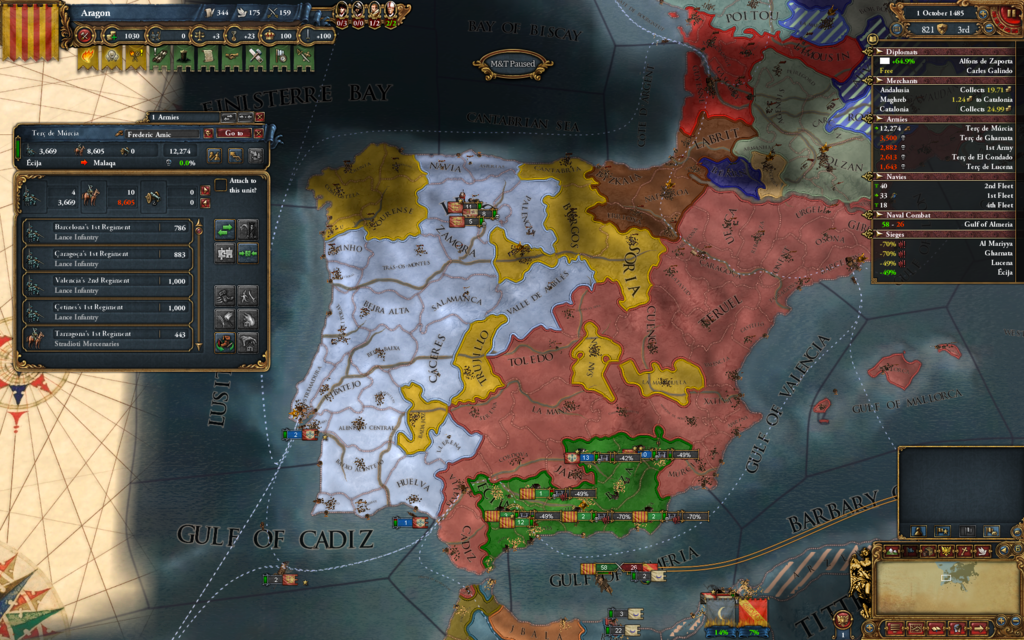
Although It sent shock waves across the continent, Portugal was far enough away from most of Europe that those reactions made no impact on the court in Lisboa. But now Joan II understood why Portugal was so willing to reenter the alliance with Aragon - it was a way to bind the two countries together again before the peace that Portugal intended to impose on Leon. Deep into the war with Granada, Aragon could only object to the terms, raise concerns about Portugal’s intentions in the markets of Seville, and send word to Lisboa that Portugal must refrain from further territorial incursions in Iberia.
~~~~~
A Note in Support of the ACAs!
Hi everyone - a short note about the ACAs. I didn’t even realize it was time again for these, but it is. Please check out the link below and nominate/vote! (And I don’t mean for this AAR - I mean for the AARs you’re most enjoying and following….I’m planning to do the same!)
Click HERE and nominate away! And VOTE!
The Early Years of Joan II
The accession of Joan II to the throne unleashed an outpouring of economic and domestic harmony. The merchants, the nobles across the various kingdoms of the Crown of Aragon, townspeople and peasants all welcomed their handsome and charismatic new young king. Among those welcoming the new king with vows of loyalty and obeisance were the rules and peoples of the provinces of Toledo and Montpelsier - the latter province won from Toulouse not that many years before.

The traders and diplomats of Aragon also brought the first whispers of lands beyond the Atlas Mountains. Control of the trading cities along the African coast were bringing not only wealth to the Crown, but were springboards for the acquisition of new knowledge about what lay beyond the lands of Fez, Morocco and Tlemcen.

While Joan directed domestic investments in roads, ports, garrisons and various government buildings throughout his domains, the court in Barcelona watched as Leon slowly conquered the lands of Castile while holding off the power of Portugal. In 1470, Leon was able to force Castile to the treaty table. In a move that surprised Aragon, relieved Castile and embittered Portugal, Leon demanded the county of Beira Baixa in return for peace. Castile was happy to oblige, offering its ally's province for peace. To this day, scholars and historians are divided on this choice - the Leonese could have gained the rich silver mines of Badajoz, or the province of Burgos (as a way to cut off Madrid from the rest of Castile’s lands, or demanded the independence of the Kingdom of Galicia. All of these choices (and countless others) could have further weakened Castile and materially strengthened Leon. Instead, it gained a province that was not core to the power of Leon and gained the enmity of the King in Lisboa. This decision would prove to be the beginning of a turning point in the history of Iberia, as we will see.

The years of focus on internal development and external peace initiated by the Regency Council and continued in the early years of Joan’s reign also saw the Grand Coalition against Aragon begin to crumble, with the Florentines being the first to set aside their distrust of the Crown.

In 1475, the event the Crown of Aragon had worked assiduously to create finally become a reality - the Duke of Anjou declared independence from his overload, the King of France, and called Aragon to war.

The Duke was one of the most significant vassals of France, and had long supported French wars throughout Gaul. In fact, France’s ability to spring back from defeat after defeat was the extensive number of vassals she held in thrall to herself. They all tended to reply to their mistress's calls to war, and would quickly bring their armies to bear in any war. Consequently, the diplomats of Aragon had long realized that neutralizing France required the breaking of the bonds of vassalage she held over the various duchies and counties of Gaul. Anjou would prove to the first of those efforts.
The war would be fought on two fronts - in the north, Anjou would France and her vassals; in the south, Aragon would join with the Angevins from Provencal to take on France. As both sides attempted to bring their major forces together, small skirmishes were fought throughout the countryside. But both sides managed to meet on the battlefield in Poitou, when the Aragonese forces caught the French who were besieging the city of Poitou.

Although the French had more men and an extremely capable commander in the person of Claude de Leon, the superior military training and tactics of Aragon and Anjou carried the day. The French were defeated and forced to flee the battlefield although they also inflicted significant damage to the Aragonese forces. Trailing after the retreating French forces, the armies of Aragon and Anjou once again met and defeated their enemies in Vianneis, although they again suffered significant losses.

Ferran Piquer, commander of the main Aragonese forces in France at this time, observed an unusual behavior among the French vassals during the Angevin war of independence in a report to Barcelona.
“I have observed an interesting feature in this war of attrition with France. In past years, according to everything we have observed and know, the vassals of France have risen at the trumpet of war to their King’s side, and marched to battle with banners flying. We know that France has triumphed on the field of battle time and again because of the loyalty of these vassals - Anjou, Bourbon, Orlean, and all the rest of the major and minor lords who follow him.
"But in this war, the vassals of France (other than Armanac, who is insignificant) have failed to rally to the banner of the golden lily. The good Duke assured us that he had himself received the word of the dukes of Orlean, Alencon, and Bourbon that they will not oppose his bid to throw off the yoke of Paris. Perhaps they, too, hope to be free of the King of the Franks, or perhaps they have not stomach to make war on one of their own. Whatever their reasons, we are grateful for their lack of involvement. And perhaps there are future opportunities to weaken France with these lords - but I will leave that to the King and his diplomatic advisors.
"In the meantime, we win the battles but at great cost to our men, horses and supplies. We require fresh troops, mounts and wagons of food and ammunition if we are to conclusively bring France to his knees. Send all of these, and money for the men.”

In late 1477, the Swiss, who had inherited the German lands of the old Duke of Burgundy, declared war on France for those possessions of the Duke that France had claimed. With the French armies defeated again and again by Aragon and Anjou, there were none to oppose the advance of the Swiss and her allies. Swiss forces quickly occupied much of France in the north.

And in this year of French disasters, the final blow was struck by Toulouse. After its last wars with England and France, it had been fractured into a few small provinces scattered across the southern reaches of France. She now sought her revenge, and declared war on an already reeling France. Within the space of a few months, the southern provinces of the King of France were occupied by the armies of Toulouse - a truly stunning return to relevance.

In 1481, with the fall of Paris, the entirety of the Kingdom of France was occupied by one of the three major sets of belligerents - Aragon/Anjou, Toulouse/Geneva, and Switzerland and her German allies. France had gone from resurgent power (conquering most of Toulouse, absorbing nice, putting Bourbonnais and Foix into strong vassalge) and expanding her domain in the south and in the territories of the old Duke of Burgundy to being shown to be nothing more than a paper tiger. In less than three years, all of her armies were defeated and her territories occupied. It was merely a question of which party the French King would negotiate with first.

As the Court in Barcelona waited to see which party the French King would approach first, news arrived of the outbreak of war between Portugal and Leon over Beira Baixa. Both sides appealed to Barcelona for aid; both requests were declined. The decision to not support either side stunned supporters of both sides in the Court, countryside, and across Europe. We can imagine the impact on the prestige of the Crown of Aragon. But the King assured his ministers in a council meeting that all would be well. In fact, some of the assurances the king offered can be found in the Royal archives. I’ve included a few extracts here (all attributed to the King, but it’s difficult to be sure given the fragmentary nature of the extracts):
“…my brothers the Kings of Portugal and Leon must surely know that we cannot and will not choose between our two most ardent allies. We love them both and we would bring them to the table to find peace if they would set aside their petty grievances and embrace each other in brotherly love…"
“Although you tell me that the enmity of Lisbon to Leon is sharp and pointed, I cannot credit these words. Both have fought many wars, some side by side against the common foe, and some treating each other as the foe. Both have gained and lost, and both remain much as they have been, united by their common religion (unenlightened but shared) and desire for balance within Hispania…"
"Regarding the prestige of the Crown and Our decision to stay aloof from the war of Portugal and Leon, let me just assure you that there are many ways to increase the regard that our loyal subjects, our traders and merchants, our noble houses and fellow rulers - and We have many plans afoot to bring the prestige and influence of our Crown to greater and greater heights."
“…we are sure that once the issue of Beira Baixa is settled, peace will return to Portugal and Leon, and we will reenter our alliances with both sides. In fact, I have instructed my diplomats to being to lay the foundation for this and they are hard at work in both courts.”

While the assurance of Joan about the prestige of the Crown will be proven over time, those about the outcome of the war between Portugal and Leon will illuminate the inexperience of the king in the diplomatic realm and the the lack of understanding of the true relations between Portugal and Leon at this time. While the king was young and could therefore be excused for not having a strong and nuanced view of the world in these early years, this was surely a failure of the diplomatic service available to the King. That, or the pro-Portuguese party at Court was successful in keeping the true nature of Portugal’s intent from him.
While war raged in Iberia, the King of France came to the peace table and granted independence to his rebellious vassal Anjou. Although the peace the Duke sought was humiliating to Paris, it was merely losing a major vassal and some revenue. No lands under the direct control of France were sought by the Duke or offered by the King - the peace was simple and easily arrived at.

With the Angevin peace established, France was able to bring her remaining vassals into the wars with the Swiss and Toulouse. But it was too little, too late. In the north, the Swiss quickly overran the provinces vacated by the Aragonese and Angevin forces, and defeated the vassals of France who answered the call the war. In the South, the armies of Toulouse did the same.
France next agreed to peace with the Swiss, and granted many cities, town and castles that had once belonged to Burgundy to them. The Swiss also insisted that the county of Champagne be granted to Lorraine, and two of France’s smaller vassals be granted total freedom. Unlike the peace with Anjou, this peace cost the king of France significant lands and money, and significantly reduced (once again) the power of France in the constellation of European powers.

As the Swiss had done before them, Toulouse moved quickly to occupy the places that this latest peace returned to the control of France.

As the war between Portugal and Leon entered it’s third year, Joan’s diplomats in Lisbon succeeded in repairing relations between the two kingdoms, and reinstating the alliance. Joan sent messages attesting to his great love and feelings of brotherhood to the Portuguese king. His diplomats in Leon, however, met with indifference and hostility - the Leonese believed that Joan had abandoned them to their fate in their hour of greatest need. But although their armies were defeated and their territory was beginning to fall, rather than accept the overtures of peace emanating from Barcelona they chose to stand their ground and fight.

By 1484, Portugal had almost total dominance over Leon, and Joan again offered his services to facilitate peace. Now the Leonese were were willing to accept his offer of mediation, but the Portuguese kept his diplomats in Lisboa while the armies of Portugal completed the occupation of Leon.

While Joan waited for his offers of mediation to be accepted, he declared war on the Emir of Granada once again. The fanaticism of the rulers of Granada once again drive non-Muslims out of the country and into the cities of Aragon - this time refugees arrived destitute at the gates of Seville in the south.

Taking advantage of the despair of the refugees and ongoing reports of continuing oppression of all non-Sunni religious communities across the Emirate, Joan declared war. The armies of Aragon advanced against Granada, quickly defeating the armies of the Emirate and beginning to put her cities and castles under siege.

And at this moment, the King of Portugal revealed the extent of his enmity against Leon, and his grand plans to expand his power, territory and influence. Although everyone at the Court in Barcelona, including Joan II, expected Portugal to reclaim Beira Baixa and perhaps the southern provinces of Leon bordering Huelva, Portugal insisted on the complete and unconditional annexation of the entire kingdom of Leon.

Although It sent shock waves across the continent, Portugal was far enough away from most of Europe that those reactions made no impact on the court in Lisboa. But now Joan II understood why Portugal was so willing to reenter the alliance with Aragon - it was a way to bind the two countries together again before the peace that Portugal intended to impose on Leon. Deep into the war with Granada, Aragon could only object to the terms, raise concerns about Portugal’s intentions in the markets of Seville, and send word to Lisboa that Portugal must refrain from further territorial incursions in Iberia.
~~~~~
A Note in Support of the ACAs!
Hi everyone - a short note about the ACAs. I didn’t even realize it was time again for these, but it is. Please check out the link below and nominate/vote! (And I don’t mean for this AAR - I mean for the AARs you’re most enjoying and following….I’m planning to do the same!)
Click HERE and nominate away! And VOTE!
Well, that was certainly a surprising move on behalf of Portugal. Hopefully you can do something to put the rest of the Iberians in the grave once and for all. It's good to see that France has been neutered by two (soon three) wars and subsequent peaces, seeing as how that should grant you relative safety from nations to the north of the Pyrenees Mountains. How's the progress going on getting to the point where you can begin colonizing the uncivilized portions of the world and exploiting their populations?
Also, it's good to see that you're back from vacation.
Also, it's good to see that you're back from vacation.
Time to gobble up the remains of Castille you can reach before Portugal does!
Thanks for putting word out about the ACA's! They are held on a quarterly schedule, so four times a year you'll have one month to vote for your favorite active AAR of the past three months.
Thanks for putting word out about the ACA's! They are held on a quarterly schedule, so four times a year you'll have one month to vote for your favorite active AAR of the past three months.
And thus it came to pass that the Iberian power struggle became of three parties instead of four. Man that isn't a pretty picture. Now that Portugal has a possibility of actually becoming a world power he will probably turn on you and you might need a new ally elsewhere's.
1- What's up with the blank flags on the official country messages?
2- Looks like that fragile Iberian balance of power you tried to maintain has unfortunately been broken.
2- Looks like that fragile Iberian balance of power you tried to maintain has unfortunately been broken.
Well, that was certainly a surprising move on behalf of Portugal. Hopefully you can do something to put the rest of the Iberians in the grave once and for all. It's good to see that France has been neutered by two (soon three) wars and subsequent peaces, seeing as how that should grant you relative safety from nations to the north of the Pyrenees Mountains. How's the progress going on getting to the point where you can begin colonizing the uncivilized portions of the world and exploiting their populations?
Also, it's good to see that you're back from vacation.
I was TOTALLY shocked that Portugal simply annexed Leon! I would have thought it would make its Over Extension too high to support. But although there will be uprisings (if my memory is correct) nothing that is terrible or uncontrollable - but I guess we'll see as I work through the picks for the next few updates!
And France it down again - but I am not about to count it out just yet. It has a remarkably strong ability to recover from every possible downturn.
And it is good to be back!
And France it down again - but I am not about to count it out just yet. It has a remarkably strong ability to recover from every possible downturn.
And it is good to be back!
Time to gobble up the remains of Castille you can reach before Portugal does!
Thanks for putting word out about the ACA's! They are held on a quarterly schedule, so four times a year you'll have one month to vote for your favorite active AAR of the past three months.
Yes - I have plans for Castile (or I should say I had some specific plans for Castile AND Portugal at this moment, but things changed. ) I still end up having plans for Castile, but they move for a while in a very different direction - different, but very interesting!
And thus it came to pass that the Iberian power struggle became of three parties instead of four. Man that isn't a pretty picture. Now that Portugal has a possibility of actually becoming a world power he will probably turn on you and you might need a new ally elsewhere's.
I'll have to address the power imbalance at some point, that's for sure. I'm particularly annoyed that Portugal just gained a TON of power in Seville, and that is supposed to be my major trade port for colonial trading. So I'll have to take care of them later! 
1- What's up with the blank flags on the official country messages?
2- Looks like that fragile Iberian balance of power you tried to maintain has unfortunately been broken.
1. I think there was some weird issue with the flags with the first part of the game. I think it was fixed with the latest Patch.
2. Yes, and see above.
All in all, I'm happy to be back - but now I have to remember everything that happened over a week ago!2. Yes, and see above.
An unexpected turn of events with Portugal annexing Leon in a such integral way! Now there are only two (three) big powers left on the Iberian Peninsula that have not been crushed: you and Portugal. Not sure who will wing against France or if Navarra is strong enough to matter, but Toulouse could for sure get ambitious. What are your relations with Toulouse, and what is the power of Navarra? I wonder if England too soon is comming back to the continent.
Woop, welcome back. Iberia ashambles and I am sad to see our green friend go, but nice to see a non referenced "strong" eastern roman empire going well after its historical fall. Great to see you back, good luck in Sevilla and can't wait to see what you do next, a grand war on the Portuguese? Now that would be an exciting entry. And btw in Hungary the blue is tengarrism, like in the hordes, it references a pre 900 dominance of the religion in the Hungarian empire, before a forceful christian conversion
~~~~~
King Joan II, Part 2
It is generally agreed that the shocking annexation of Leon by Portugal focused the attention and spurred the involvement in government by Joan II to levels far above the preceding two decades.
One other possibility exists to explain Joan’s much more personal and active involvement in affairs of state - the appearance in the late 1470s of Isabel of Trastamara at the royal court.
The Trastamara were, of course, intimately involved in the rise of Aragon and the fall of Castile - their attacks on Peter of Castile in the mid 1350s opened the door to the expansion of Aragon in Iberia. For several years there had been rumors of an Isabel (or Ysabelle, or Isebet, or a few other variants of the name) who claimed descent from the Trastamara line. She was said to be actively courting the peasants as well as disaffected nobles in the old Castilian provinces now ruled from Barcelona. There were certainly enclaves of Castilian and Trastamaran supporters in these border provinces, and some of the provinces still had not fully accepted rule from Barcelona even after a century or more under the Crown of Aragon. It is not hard to believe that a charismatic person (man or woman) could fan flames still smoldering in these remote places.
In any event, Isabel of Trastamara finally imposed herself on the consciousness of the Court by claiming that she had been secretly married to Joan II. She spun a story of being cast aside by Joan and threatened to raise the banner of rebellion for an infant she claimed was her son, and rightful heir to Aragon (and she would rule as regent, naturally.) She gathered supporters as a candle gathers moths. And she suddenly became a very serious concern for Joan and his ministers. With most people in this period tied very tightly to their villages and farms, most had no idea who the wife of the King was, and so Isabel was able to create a whirl of controversy and confusion in the countryside.
Joan sent troops to escort Isabel to the court - why she went we can only guess. But perhaps like all charismatic delusion people, she had convinced herself that her story was true, or that she could at least carry it off, and perhaps come out for the better. And in fact, the King was very much taken with her charisma, cunning and capabilities. While of course not interested in supporting her claims to his throne, he brought his own charms and charisma to bear, and eventually convinced Isabel to serve him. Her supporters were bought off with gold and promises of investments and developments (the nobles and merchants) and harsh treatment (the peasants). Isabel ended up serving Joan as his key foreign policy advisor for many years, and was instrumental in driving some key developments over the next few years - but it was a close call for the stability of the Crown.
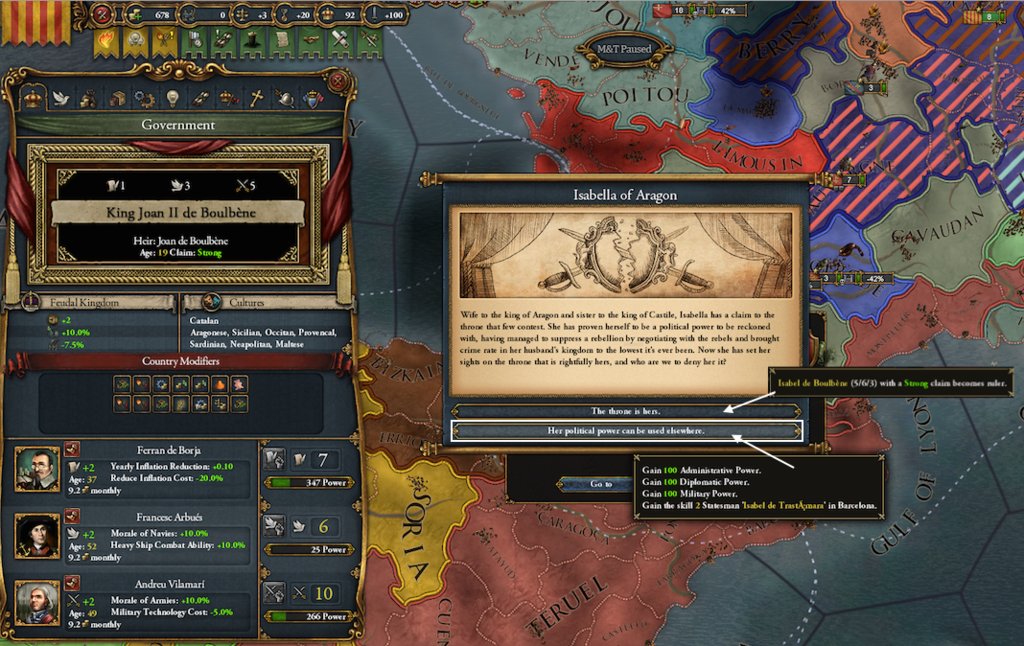
Soon after the issues with Isabel were settled, Toulouse and France ended their war, with Toulouse gaining back not only the territories she had lost to France in the last war, but even more. Combined with the freeing of Nice, the loss of the Burgundian provinces to Switzerland, the freeing of Anjou (including Provence) and her inability to defeat the English, France was once again a shattered husk of its former self.
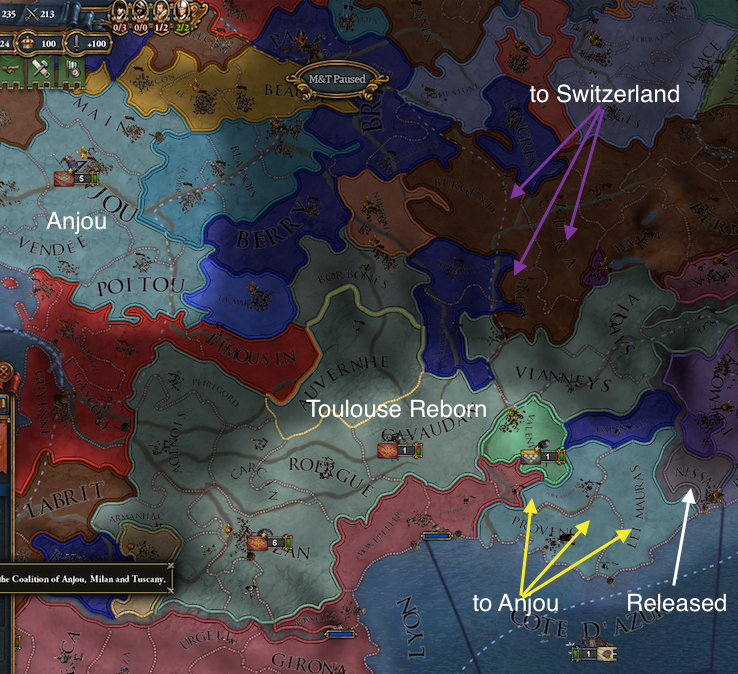
In fact, France had fallen so far from its pinnacle that it was no longer counted among the major powers of Europe.
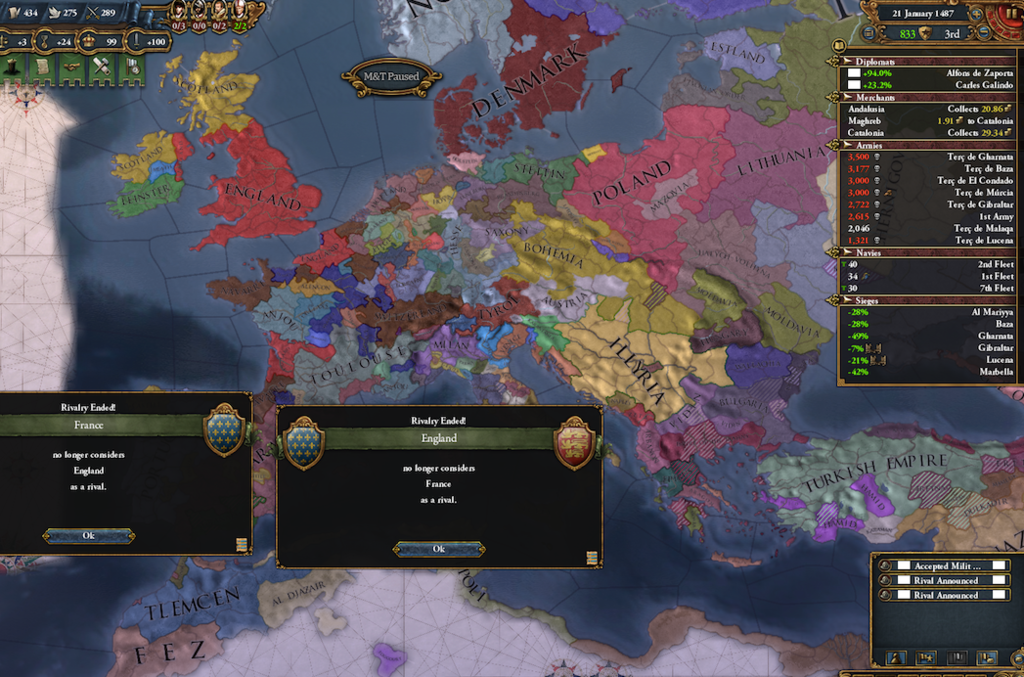
What were some of the activities that engaged the king’s attention and occupied his time in these years?
At the top of the list was what to do about Portugal. Although Joan, his military, the merchants and traders active throughout Iberia and the Mediterranean, and the nobles across Aragon were united in their opposition to the annexation of Leon, Joan decided the alliance with Portugal was simply too important to put at risk, at least at that time. He writes this, in a letter to Isabel, after she assumed the post of chief foreign policy advisor.
Diplomats were sent to Lisbon to create the best possible relations with the Crown of Portugal. In fact, the road between Barcelona and Lisbon would be worn smooth by the tread of diplomats over the rest of Joan’s reign - the Portuguese Alliance would remain the centerpiece of his foreign policy.
Secondly, Joan declared war on the Emirate of Granada. This, too, would become a central activity of the reign of Joan. It helped bind the people of Aragon together, it allowed Aragon and Portugal to collaborate against a common foe (rather than against each other), and with that collaboration it helped the Aragonese military dissolve some of the distrust it felt against its Portuguese counterpart.
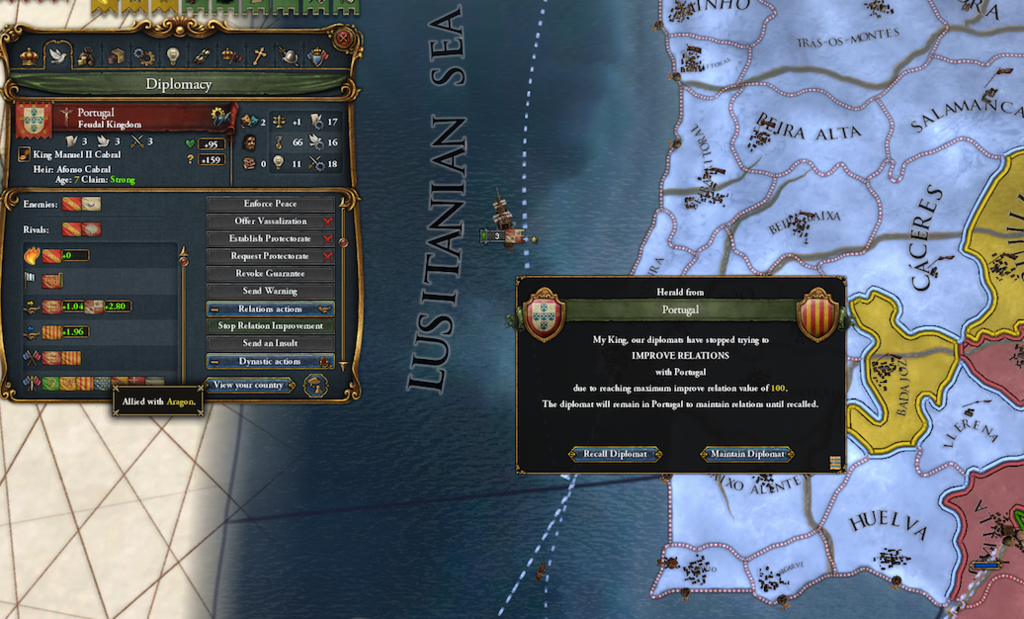
Over the course of the summer and autumn of 1486, Granada’s armies were quickly overwhelmed and her major cities and fortresses besieged.
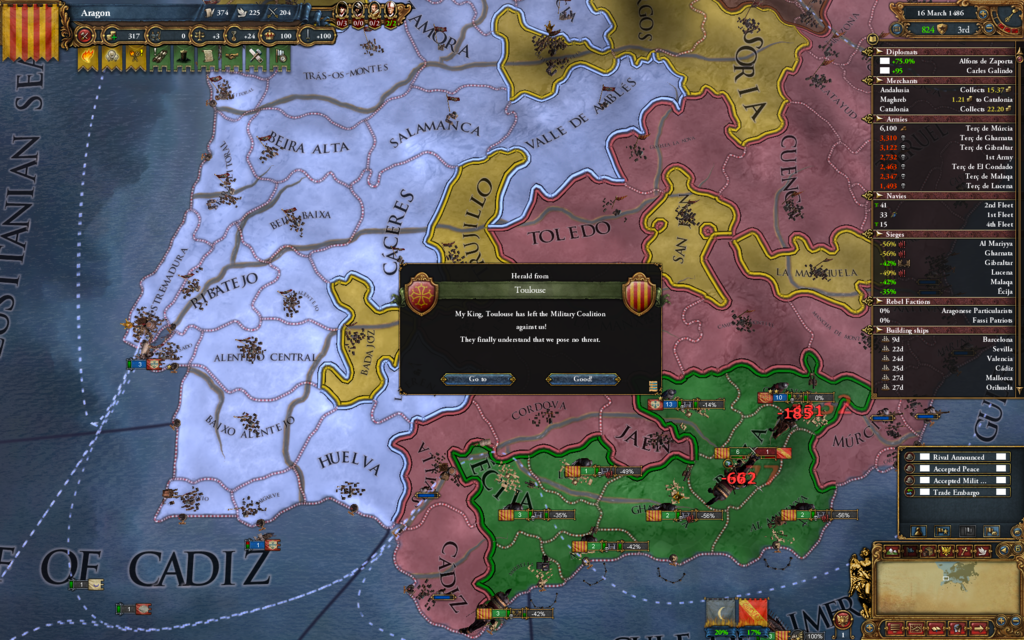
Unlike the previous wars between Aragon and Granada, this war was one of sieges and waiting. With the armies of Granada swept from the field quickly, Aragon simply had to wait for the fall of the Emirate’s cities and forts. Although this would end up taking almost two years, it did not require the full (or even partial) concentration of the king or the administration.
In 1488, as the war in Granada was slowly yielding results (the Granadan defenses had proven to be resilient, even though their armies on the field had not), Aragon turned its eyes westward to Castile and declared war. The goal of this war was two-fold - seize the rich silver mines of Badajoz before the Portuguese could (even though this would create a strangely isolated position almost completely surrounded by Portuguese territory), and eliminate some of the other Castilian territory that sat deep within Aragon.
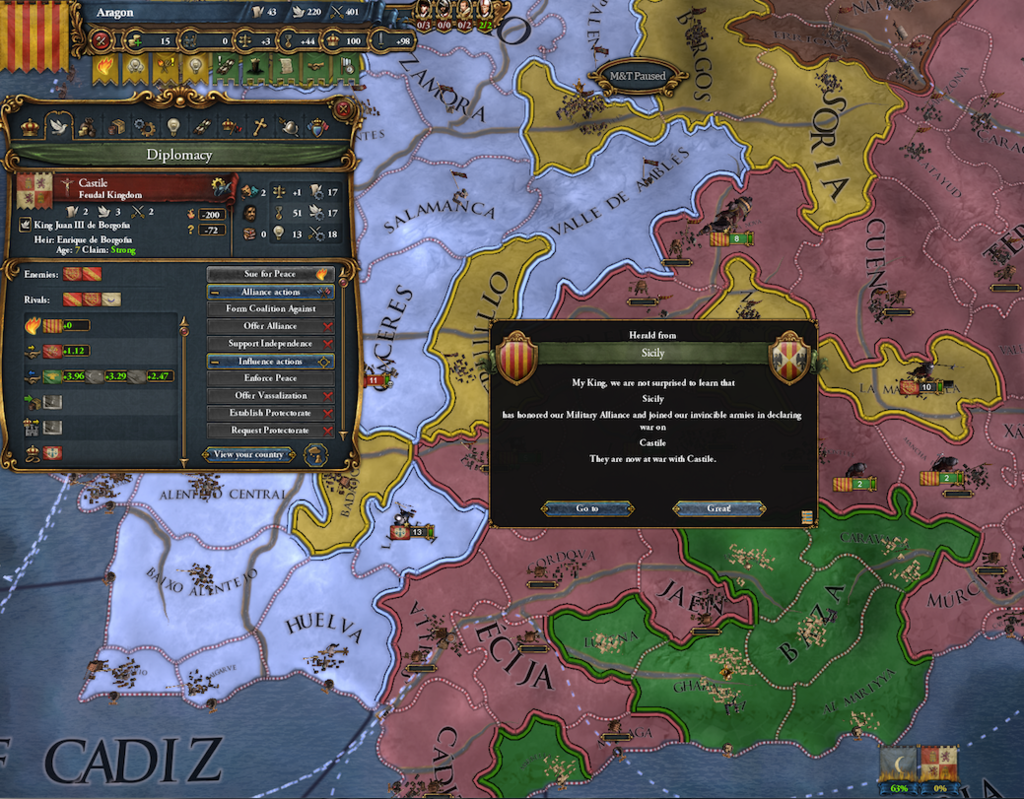
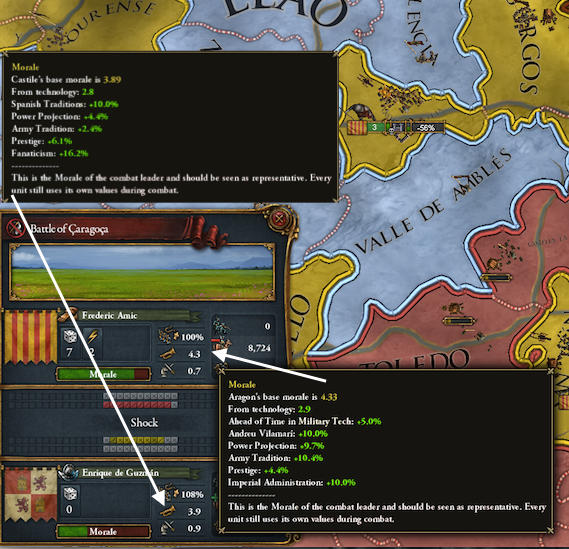
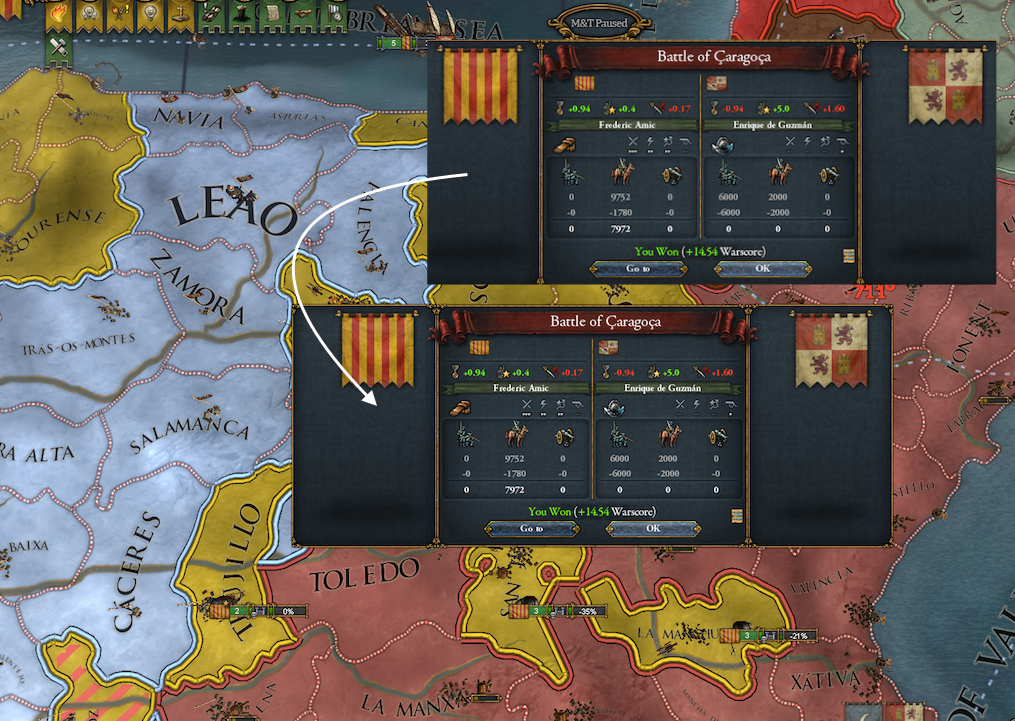
By the end of 1488, Castile’s armies had been defeated and eliminated, her provinces were being put under siege, and the stark difference in the capabilities of the generals of Aragon vs. those of Castile was clear to see. The war with Granada was also at an end. Joan’s goals in the war with the Emirate had been the fertile fields of Malaqa (a major producer of sugar, then a rare commodity and worth owning); he also wanted the province of Ecija to link Cadiz and Cordoba to Malaqa. The Emir reluctantly surrendered these territories (which also cut the Emirate into two pieces), and Aragon strengthened her hold over the trade in Seville.
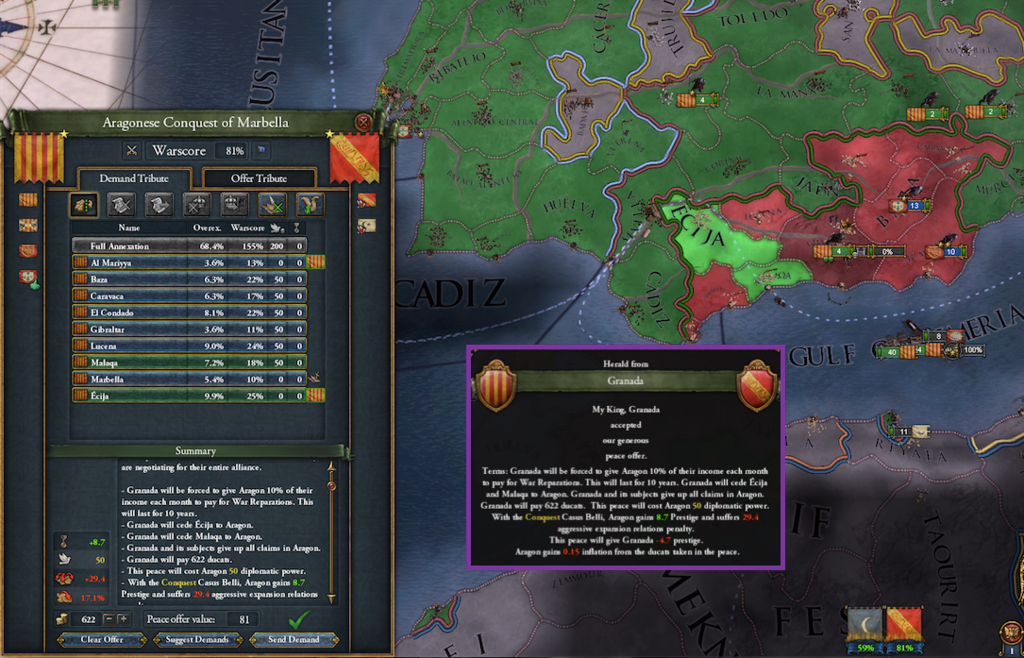
By 1489, Castile was also beaten and was forced to surrender the silver mines of Badajoz as well as the cities and fortresses of San Juan.
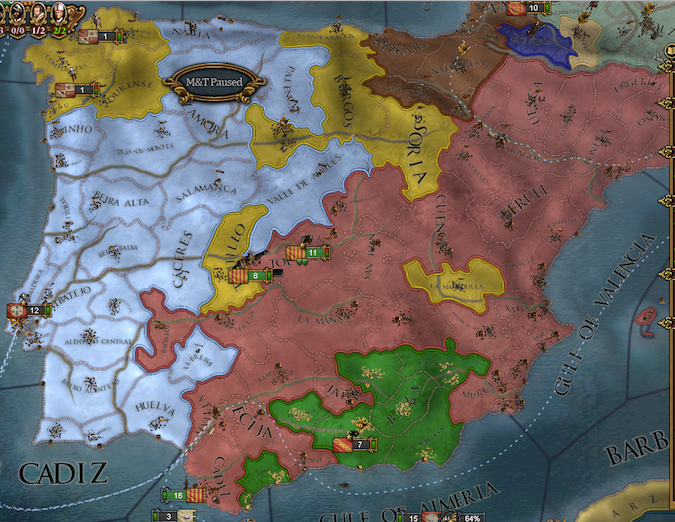
With the war reparations and the immense wealth now pouring through the trade centers of Seville and Barelona, Joan launched an extensive road building efforts across the conquered territories in Iberia in order to move closely bind the distant towns and ports to Barcelona.
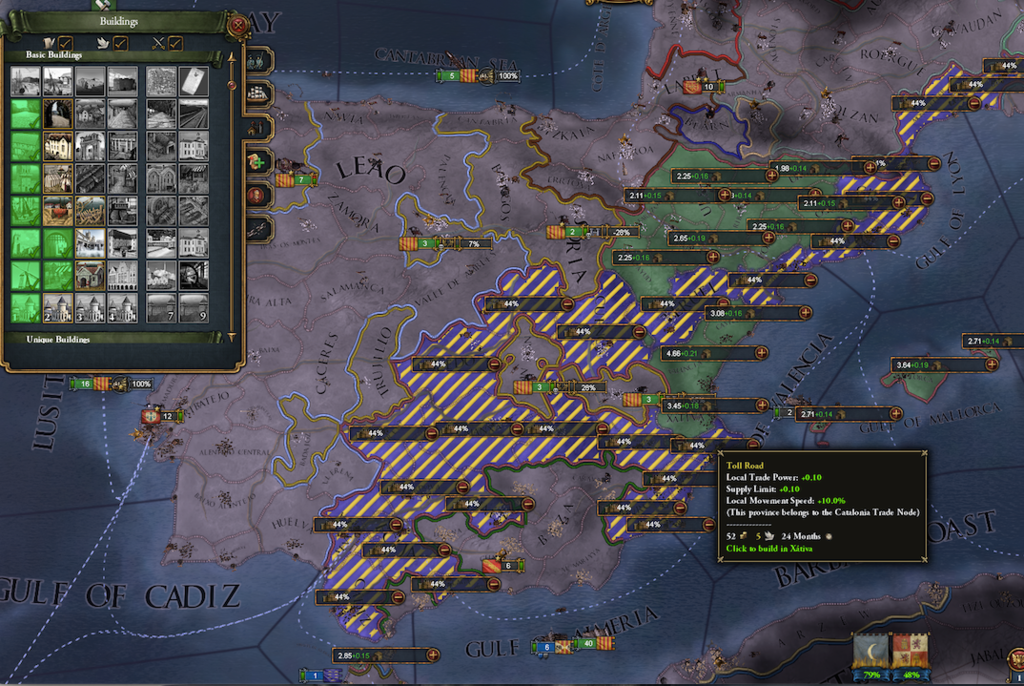
Following peace with Castile, Joan was finally in a position to introduce a significant change in the nature of the Crown. As we’ve discussed earlier, the Crown was a fairly decentralized (although slowly becoming less decentralized) union of many kingdoms, principalities, counties, trading cities, and other assorted political units. Joan and his ministers realized that the sprawling kingdom needed additional powers to help maintain central oversight of these political units. And so, in 1498, Joan II issued edits declaring the Crown of Aragon an Empire, with himself as Emperor. it improved the morale of the military, allowing the army to recruit more men more quickly, it actually improved internal and external diplomatic relations, and increased income from the Kingdom of Sicily, Aragon’s only major vassal at this time.
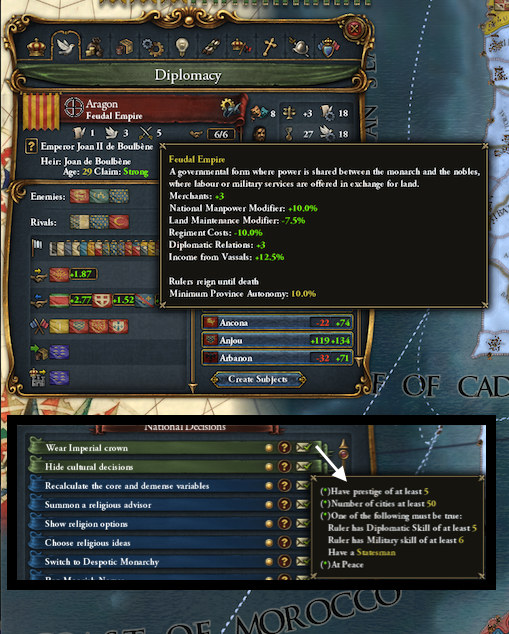
The second transformational event Joan was able to announce was, in the words of the Imperial Edit issued by Joan, the dawning of an Age of Exploration:
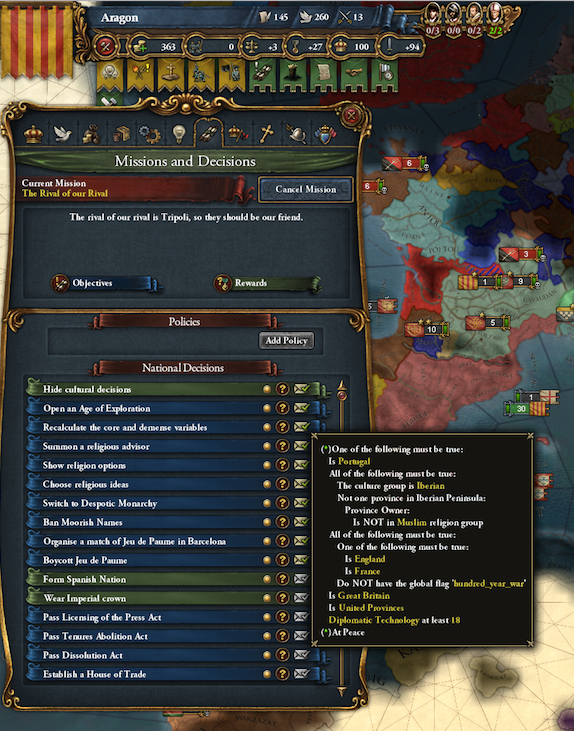
Joan knew that the Portuguese and Castilians sent ships south, beyond the Canaries. But to where was not known, and he feared that the Portuguese and the Castilians were finding new territories and sources of wealth in areas beyond the knowledge of the Crown. He was determined to close this knowledge gap.
~~~~~
But stating the goal of discovery was easier than accomplishing the same. For almost 10 years the Kingdom pursued every possible avenue of discovery - merchants were bribed to reveal their sources, scouts were sent into the wilderness (not explorers, but intrepid locals who hoped to find great riches and knowledge, but none of whom returned), spies were sent to Portugal and Castile (both of which clearly knew what lay beyond the borders of the vast Sahara and south beyond the Moroccan shores) - none of these efforts bore any fruit for many years.
War was even declared on Granada again in the hope that secret chambers could be found in the Emir’s palace showing the land and sea routes to the distant Indies and the coasts of China. Although Granada again fell quickly, no progress was made against the grand goal that the Emperor had set his people.
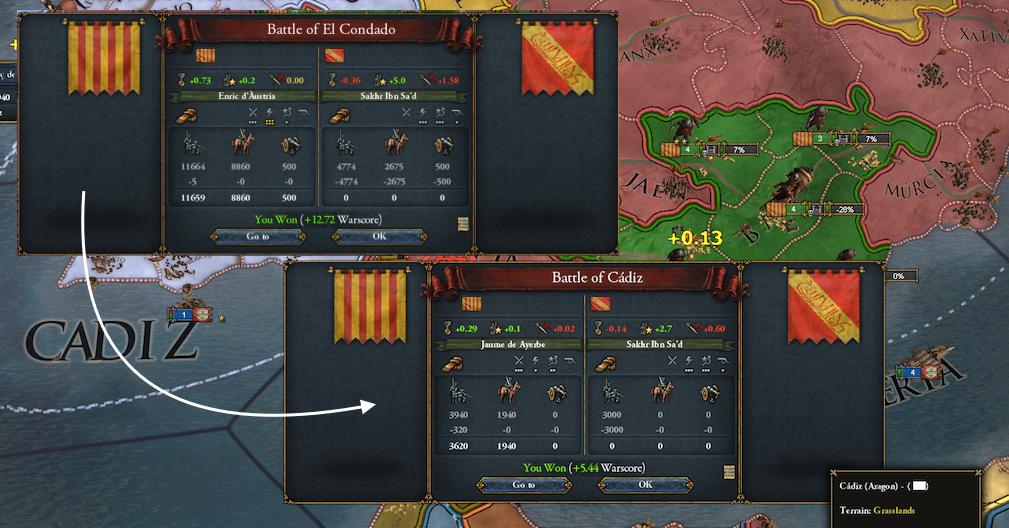
The palaces of the Emir were searched for every possible piece of information, the ports were ransacked and the forts were overturned, but nothing of use was found. Peace was agreed, and Aragon returned to its efforts to discover the routes across the desert and beyond the known seas.
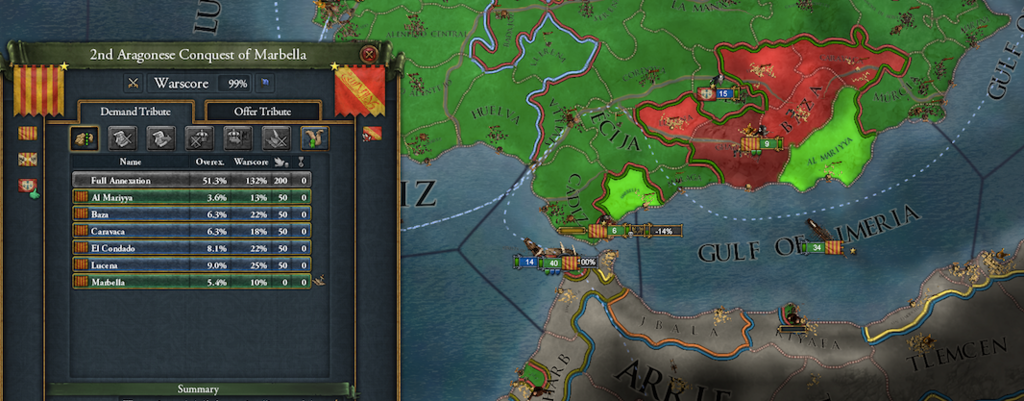
And then in 1498 - almost an entire decade after the grand pronouncement by Joan II - the Portuguese offered the first glimpse of what lay along the coasts of Africa beyond Morocco. And it was not just what lay there, but which countries were to be found there. And it becomes clear to Joan the reasons why Portugal suddenly was willing to share what it had for so long sought to hide.
The English, long the allies of Portugal, were now spreading their tentacles along the coasts of Africa - finding the protected harbors and settling their colonists, armed men and traders in them, like the pearls in a strand, or the links in an iron shackle forming around Africa. And where England was not, Castile was - and Portugal appeared to be locked out of the harbors and the trade of Africa. There is a note in the Imperial Archives that addresses this moment:
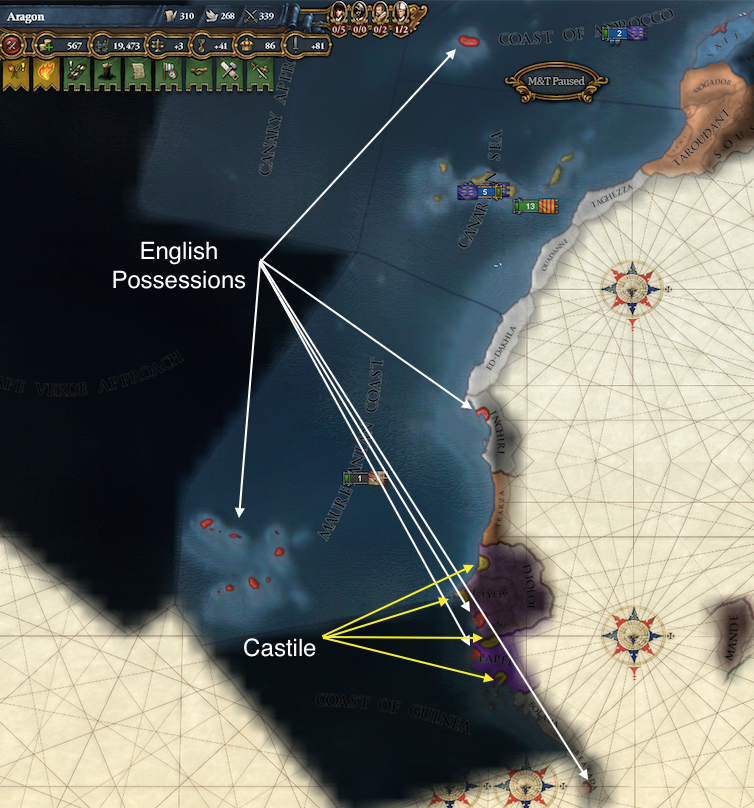
So the joy at finally beginning to penetrate the vast unknown lands and seas beyond Morocco were tempered in the Imperial Court by three things:
While Aragon fought Castile, things were happening elsewhere in Europe. Joan’s agents sent back regular reports, many of which remain in the archives for scholars today. A few interesting developments were afoot across Europe as the continent closed in on 1500.
Among these:
1. France was attempting yet another renaissance by attempting to recover lands recently won by Toulouse.
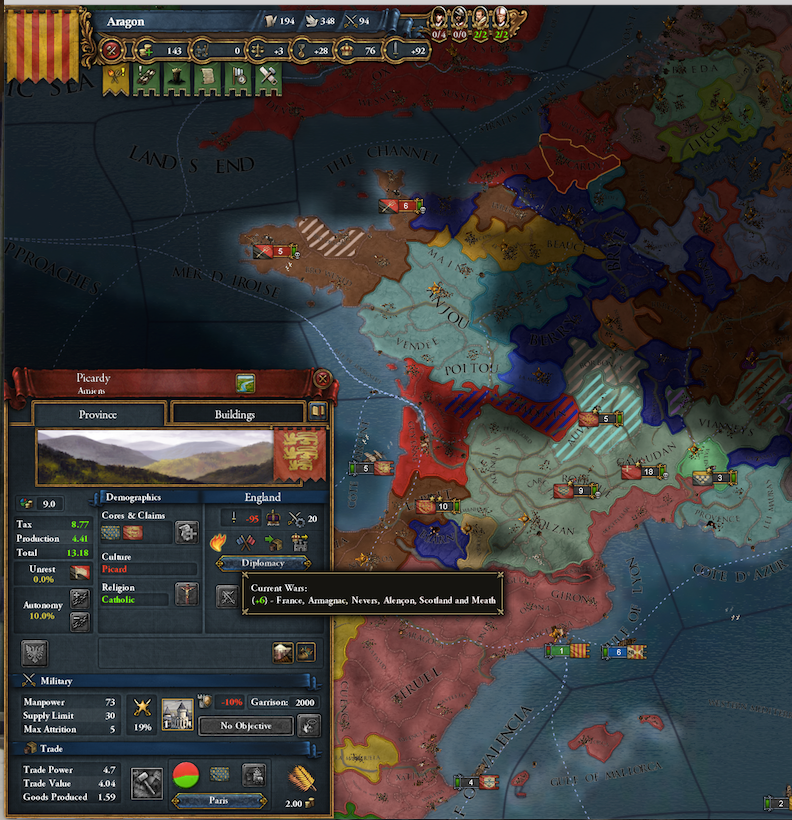
2. Switzerland reached the height of its prosperity and size, with extensive possessions in the Low Countries and Holland as its vassal. It also had strong allies in Lorraine and Milan. Joan had to consider whether Switzerland was an ally or a potential foe.
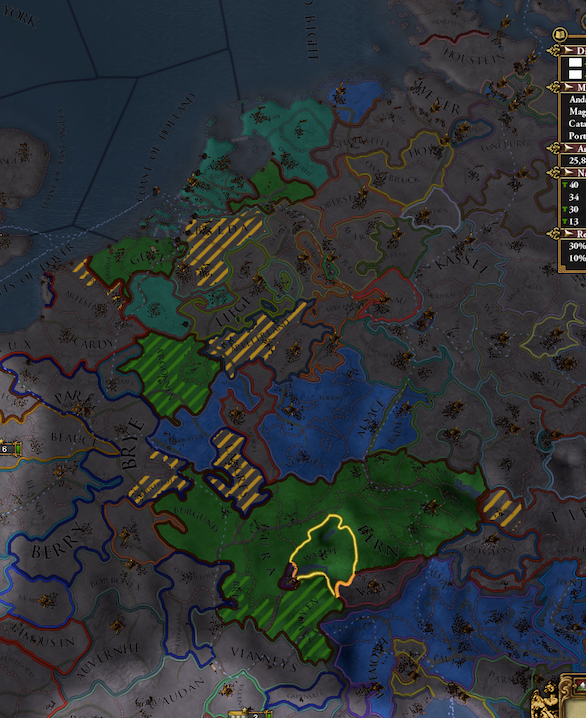
3. The ancient kingdom of Bosnia transformed itself into a revitalized version of the even more ancient kingdom of Illyria, and displaced Hungary as the leading power in the Carpathian Basin. It also became a major rival to Venice, with each vying to control Dalmatia and the trade on the Adriatic. Byzantium also reached new heights of power, although it would continue to be plagued by peasant uprisings for many years.
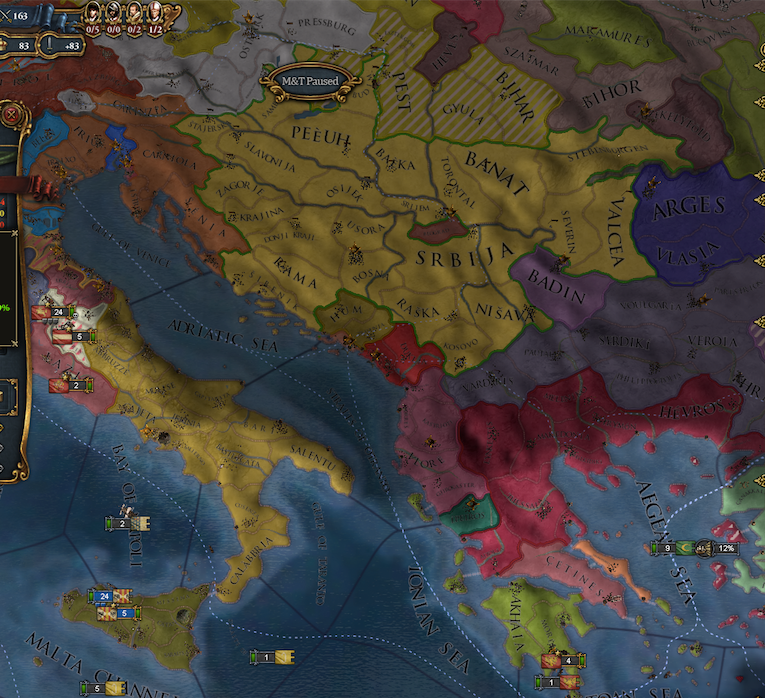
4. Taking advantage of the French wars against Toulouse, nobles styling themselves descendants of the ancient House of Guyenne rebelled against Toulouse, and having overpowered the local garrisons were able to gain independence. Toulouse immediate declared war, but Guyenne managed to hold off the armies of Toulouse and even capture some territory as it worked to force the recognition of its independence.
An even more amazing event briefly illuminated the Gnostic world at this time. Anjou, recently independent of France, was really a country split in two distinct geographic parts - the heartland of Anjou in the northern French countryside, and the rich provinces in the south that made up the ancient Kingdom of Provence. The peasants and nobles of Provence, seeing their chance, rebelled against the Duke of Anjou. After reducing the cities and fortresses into submission, these men of Provence were able to wrest control away from the Duke. And instead of creating yet another Duchy in the south of France, the revolutionaries did something extraordinary. They elevated the Gnostic Bishop of Provence to a position of Gnostic Pope. It was an amazing event, and one about which there are several excellent studies already written. Aragon quickly offered an alliance with the Gnostic Pope, which he accepted - there was a strong desire on the part of Aragon to see the prestige of what had once been a heretical religion protected and fostered.
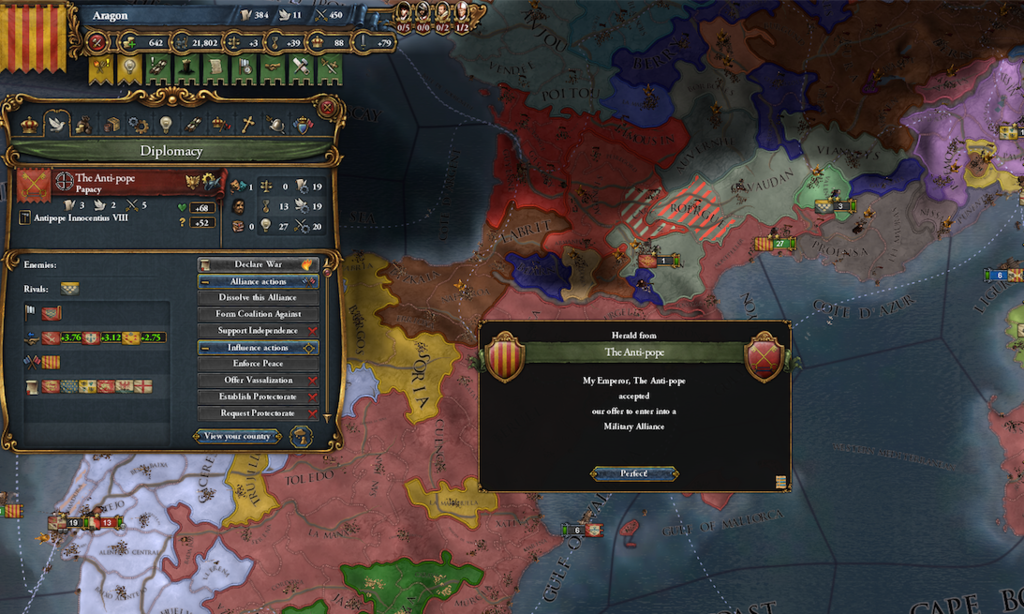
5. The long Mamluk - Anazah war came to and end, with the Mamluk’s victorious and gaining lands along the Red Sea. it’s important to this study in one way only - the Crown of Aragon and the Mamluk kingdom in Egypt had long been allies and had intermarried over many generations. Until the Azanah war, however, the Mamluks had never requested not offered military aid to the Crown. For Aragon the value of the alliance lay in the ability, if needed, for the Mamluks to quickly deeply troops to defend Athens and the surrounding province. That had never been needed, but the alliance was worth keeping as it cost nothing to maintain and promised help in the eventuality it would be required. On the other hand, the fact that no troops were ever sent from Aragon to support the Mamluks, or the reverse, means that it has been ignored with no detriment to our study of Aragon up to this point. While it may seem strange to have not mentioned this earlier, this alliance (although over 100 years old at this time) simply had never been a factor in any Aragonese war up to this point.
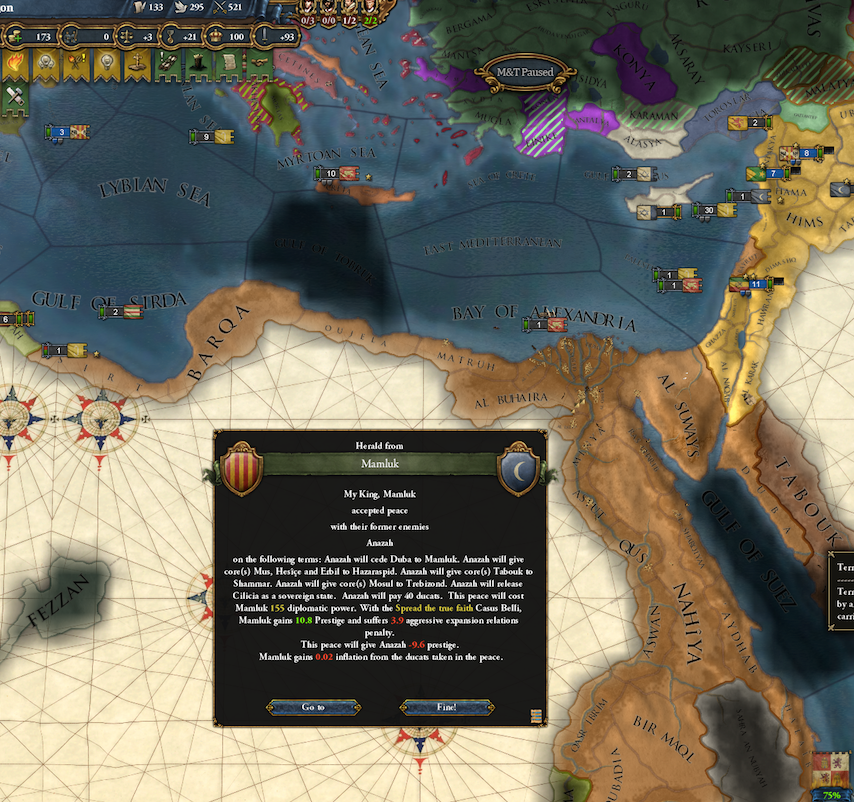
Joan and his domestic advisors commissioned a study of the Crown at the turn of the century. We don’t know most of what was included, but a few bits of data remain. Among those are data showing the ethnic, religious, and production makeup of the Kingdoms and Aragon. This data, fragmentary as it is, shows the openness and multi-everything nature of the Crown at this time. In so may ways, the Crown was unique in European history at the time, and it will remain so for a long time as we will see.
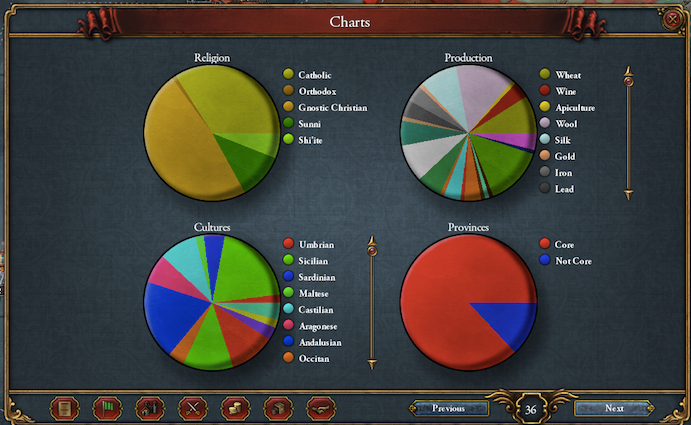
As the African ports of Castile began to fall to Aragon, and as the armies of Aragon and Navarre fought and sieged the eastern provinces of Castile, another almost unprecedented event happened. The African nation of Jolof, long a protectorate of Castile, threw off the control of Castile and actually landed troops in the Galician provinces of its former overlord. Although they proved to almost completely ineffective (there’s not a record of single battle being won by these troops, or city being captured by the Jolofian troops), it was a fact that no African forces had invade Iberia for hundreds of years, and no sub-Sarahan African troops had ever managed to invade Europe. It certainly indicated the depths to which Castile was falling at the time.
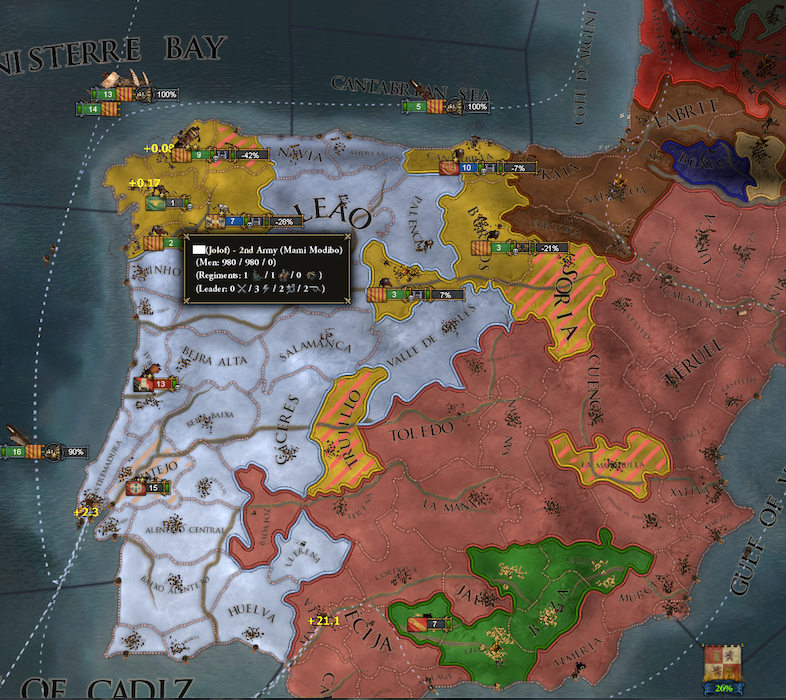
In 1503, the Pope somehow managed a fantastically Machiavellian coup. With the riches of centuries, the cunning of a fox and the morality of the most wanton whore, he cajoled, bribed, threatened and finally wore down the will of the Gnostic Pope in Provence. In return for becoming the Cardinal of Provence and (the rumors at the time said) for mountains of gold and seas of pearls, the Gnostic Pope resigned and passed his territories to Rome. It is said that the bells of the churches throughout Aragon tolled in mourning for 100 days.
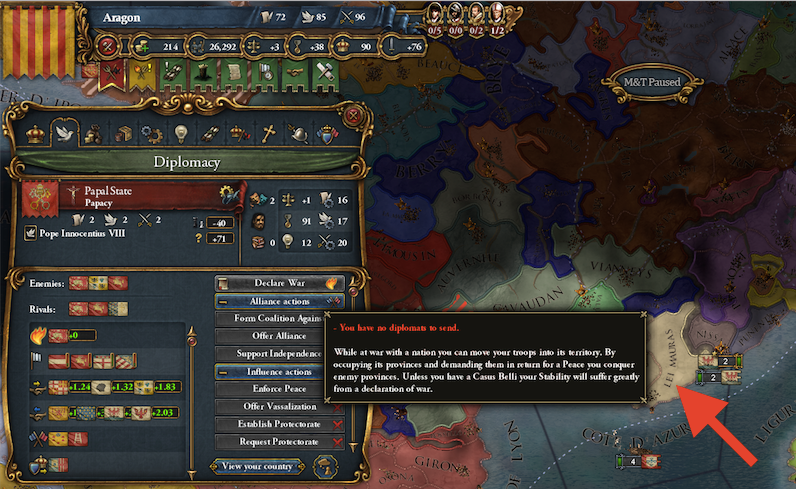
With this brilliant maneuver, the Pope more than doubled his territory, and became a relevant political power in Europe again. And he gained the enmity of Aragon, which would soon begin efforts to revive the ancient claims to Provence - once held by the Counts and Princes of Barcelona.
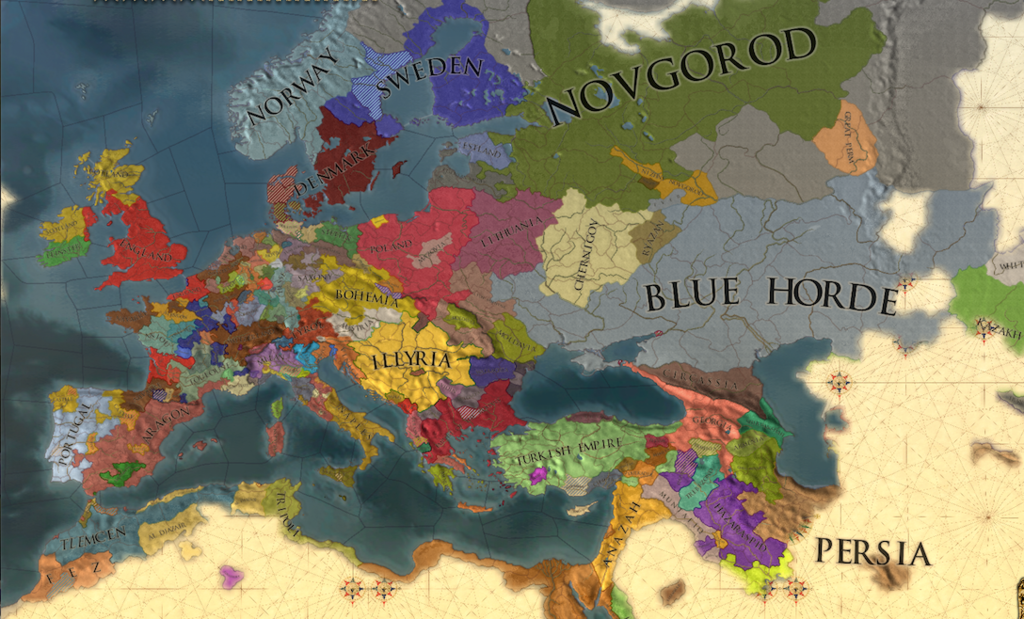
In 1504, Castile finally defeated. At the negotiating table, Aragon surprised Castile by only claiming the 4 African enclaves. Castile happily surrendered them to Aragon, confident that she had avoided the much worse fate of further losses in Iberia. To Aragon,however, these 4 cities were the first step toward recovering lost ground in the race to discover the land and sea routes to the distant East.
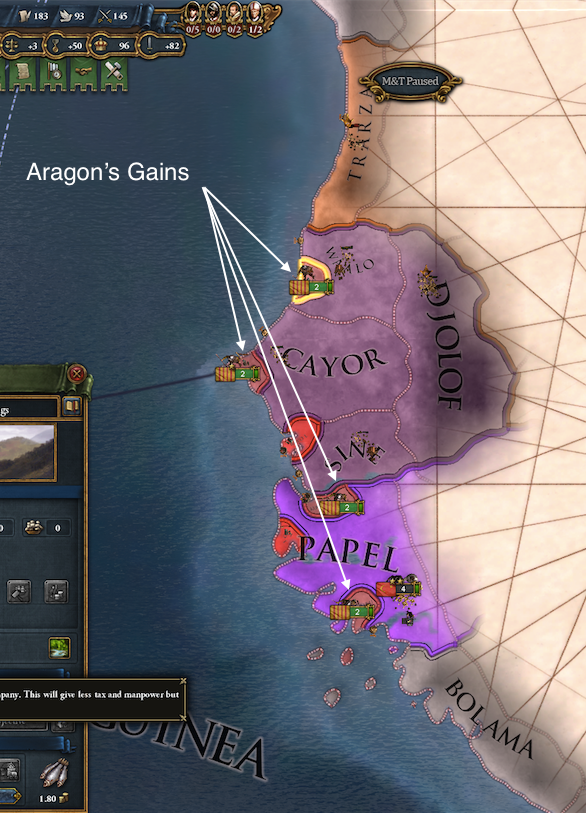
And in fact, the knowledge, contacts, maps and alliances with local elites that were gained by acquiring these 4 trading entrepôts delivered the longed-for knowledge. Within just a few years, the Crown of Aragon had gathered enough information about Africa, the Levant and the far-off Indies to produce the following map - it was a signifiant leap forward in the long-term designs of the Crown to find and dominate the trade routes to the East.
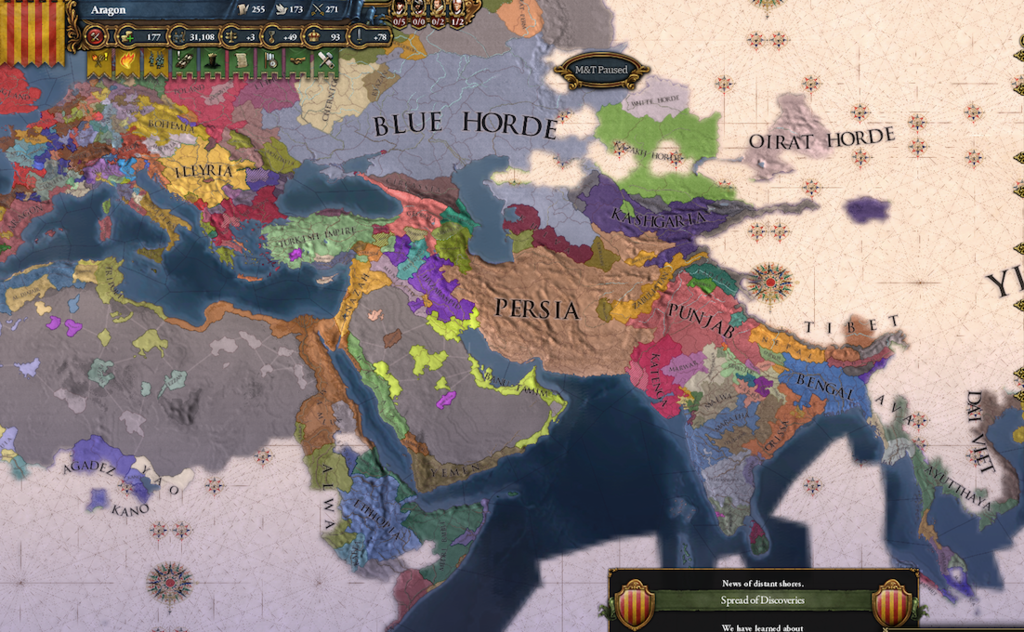
And finally, after an extraordinary reign of almost 4 decades, Joan II, first Emperor of Aragon, died. He was succeeded by his brother, also named Joan, who rose to the throne as Emperor Joan III.
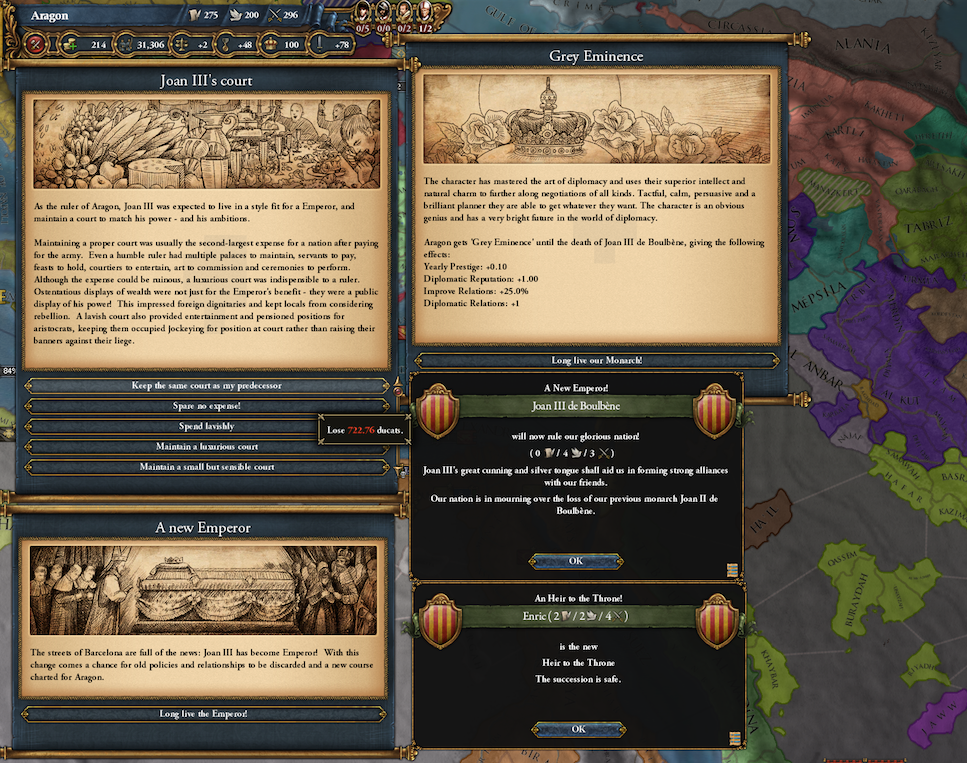
King Joan II, Part 2
It is generally agreed that the shocking annexation of Leon by Portugal focused the attention and spurred the involvement in government by Joan II to levels far above the preceding two decades.
- It might have been that he felt his diplomatic and spy corps had failed him completely by failing to alert him to the possibility of the wholesale disappearance of Leon.
- It might have been that the merchant and traders spread their fear of Portugal’s intentions in Seville, now that it exercised significant power there thanks to its expanded Iberian holdings.
- It might have been that the rise of Portugal from a key, but junior ally into a powerful competing presence in Iberia, and one poised on the borders of the Kingdom alarmed the military enough for them to push the king into a more active role in the government.
One other possibility exists to explain Joan’s much more personal and active involvement in affairs of state - the appearance in the late 1470s of Isabel of Trastamara at the royal court.
The Trastamara were, of course, intimately involved in the rise of Aragon and the fall of Castile - their attacks on Peter of Castile in the mid 1350s opened the door to the expansion of Aragon in Iberia. For several years there had been rumors of an Isabel (or Ysabelle, or Isebet, or a few other variants of the name) who claimed descent from the Trastamara line. She was said to be actively courting the peasants as well as disaffected nobles in the old Castilian provinces now ruled from Barcelona. There were certainly enclaves of Castilian and Trastamaran supporters in these border provinces, and some of the provinces still had not fully accepted rule from Barcelona even after a century or more under the Crown of Aragon. It is not hard to believe that a charismatic person (man or woman) could fan flames still smoldering in these remote places.
In any event, Isabel of Trastamara finally imposed herself on the consciousness of the Court by claiming that she had been secretly married to Joan II. She spun a story of being cast aside by Joan and threatened to raise the banner of rebellion for an infant she claimed was her son, and rightful heir to Aragon (and she would rule as regent, naturally.) She gathered supporters as a candle gathers moths. And she suddenly became a very serious concern for Joan and his ministers. With most people in this period tied very tightly to their villages and farms, most had no idea who the wife of the King was, and so Isabel was able to create a whirl of controversy and confusion in the countryside.
Joan sent troops to escort Isabel to the court - why she went we can only guess. But perhaps like all charismatic delusion people, she had convinced herself that her story was true, or that she could at least carry it off, and perhaps come out for the better. And in fact, the King was very much taken with her charisma, cunning and capabilities. While of course not interested in supporting her claims to his throne, he brought his own charms and charisma to bear, and eventually convinced Isabel to serve him. Her supporters were bought off with gold and promises of investments and developments (the nobles and merchants) and harsh treatment (the peasants). Isabel ended up serving Joan as his key foreign policy advisor for many years, and was instrumental in driving some key developments over the next few years - but it was a close call for the stability of the Crown.

Soon after the issues with Isabel were settled, Toulouse and France ended their war, with Toulouse gaining back not only the territories she had lost to France in the last war, but even more. Combined with the freeing of Nice, the loss of the Burgundian provinces to Switzerland, the freeing of Anjou (including Provence) and her inability to defeat the English, France was once again a shattered husk of its former self.

In fact, France had fallen so far from its pinnacle that it was no longer counted among the major powers of Europe.

What were some of the activities that engaged the king’s attention and occupied his time in these years?
At the top of the list was what to do about Portugal. Although Joan, his military, the merchants and traders active throughout Iberia and the Mediterranean, and the nobles across Aragon were united in their opposition to the annexation of Leon, Joan decided the alliance with Portugal was simply too important to put at risk, at least at that time. He writes this, in a letter to Isabel, after she assumed the post of chief foreign policy advisor.
“The Portuguese have most certainly overstepped themselves. You are probably right - the nobles of Leon will chafe at their new-found subservience to Lisboa, the nobles of Castile will chafe at being subordinated to the coastal Portuguese, and the townspeople and merchants will have to learn Portuguese to continue in their various callings and careers.
And of course, we are alarmed at the overnight growth of what was our friend into a potential enemy. But we cannot ignore them. If not our friend, then they will default to being our enemy. Once they sat on the edge of Europe, looking out at the sea and whatever lays beyond that. But now they sit in the middle of Iberia, and press on our borders. So we have to choose - do we embrace them in an even tighter brotherly love, or do we antagonize them in ways that will inevitably lead to war?
I want to hear your voice on this, but I know my own mind - I see Portugal as indeed a friend near and dear to our heart, and believe they see us in the same light. So I will not have them antagonized by petty or even major things - we will work to assure them of our trust and friendship.”
And of course, we are alarmed at the overnight growth of what was our friend into a potential enemy. But we cannot ignore them. If not our friend, then they will default to being our enemy. Once they sat on the edge of Europe, looking out at the sea and whatever lays beyond that. But now they sit in the middle of Iberia, and press on our borders. So we have to choose - do we embrace them in an even tighter brotherly love, or do we antagonize them in ways that will inevitably lead to war?
I want to hear your voice on this, but I know my own mind - I see Portugal as indeed a friend near and dear to our heart, and believe they see us in the same light. So I will not have them antagonized by petty or even major things - we will work to assure them of our trust and friendship.”
Diplomats were sent to Lisbon to create the best possible relations with the Crown of Portugal. In fact, the road between Barcelona and Lisbon would be worn smooth by the tread of diplomats over the rest of Joan’s reign - the Portuguese Alliance would remain the centerpiece of his foreign policy.
Secondly, Joan declared war on the Emirate of Granada. This, too, would become a central activity of the reign of Joan. It helped bind the people of Aragon together, it allowed Aragon and Portugal to collaborate against a common foe (rather than against each other), and with that collaboration it helped the Aragonese military dissolve some of the distrust it felt against its Portuguese counterpart.

Over the course of the summer and autumn of 1486, Granada’s armies were quickly overwhelmed and her major cities and fortresses besieged.

Unlike the previous wars between Aragon and Granada, this war was one of sieges and waiting. With the armies of Granada swept from the field quickly, Aragon simply had to wait for the fall of the Emirate’s cities and forts. Although this would end up taking almost two years, it did not require the full (or even partial) concentration of the king or the administration.
In 1488, as the war in Granada was slowly yielding results (the Granadan defenses had proven to be resilient, even though their armies on the field had not), Aragon turned its eyes westward to Castile and declared war. The goal of this war was two-fold - seize the rich silver mines of Badajoz before the Portuguese could (even though this would create a strangely isolated position almost completely surrounded by Portuguese territory), and eliminate some of the other Castilian territory that sat deep within Aragon.



By the end of 1488, Castile’s armies had been defeated and eliminated, her provinces were being put under siege, and the stark difference in the capabilities of the generals of Aragon vs. those of Castile was clear to see. The war with Granada was also at an end. Joan’s goals in the war with the Emirate had been the fertile fields of Malaqa (a major producer of sugar, then a rare commodity and worth owning); he also wanted the province of Ecija to link Cadiz and Cordoba to Malaqa. The Emir reluctantly surrendered these territories (which also cut the Emirate into two pieces), and Aragon strengthened her hold over the trade in Seville.

By 1489, Castile was also beaten and was forced to surrender the silver mines of Badajoz as well as the cities and fortresses of San Juan.

With the war reparations and the immense wealth now pouring through the trade centers of Seville and Barelona, Joan launched an extensive road building efforts across the conquered territories in Iberia in order to move closely bind the distant towns and ports to Barcelona.

Following peace with Castile, Joan was finally in a position to introduce a significant change in the nature of the Crown. As we’ve discussed earlier, the Crown was a fairly decentralized (although slowly becoming less decentralized) union of many kingdoms, principalities, counties, trading cities, and other assorted political units. Joan and his ministers realized that the sprawling kingdom needed additional powers to help maintain central oversight of these political units. And so, in 1498, Joan II issued edits declaring the Crown of Aragon an Empire, with himself as Emperor. it improved the morale of the military, allowing the army to recruit more men more quickly, it actually improved internal and external diplomatic relations, and increased income from the Kingdom of Sicily, Aragon’s only major vassal at this time.

The second transformational event Joan was able to announce was, in the words of the Imperial Edit issued by Joan, the dawning of an Age of Exploration:
“For too long we have been content to sit on the edges of Africa, accepting into our markets the camel trains that lumbered out of the desert loaded with gold and exotic spices, silks and dyes, and other products. We happily welcomed these to our ports; we profited from them and sent other goods back into the unknown.
"But our age of ignorance must come to an end. To control trade we must learn of the sources of these goods - the gold, spices, silks, dyes, slaves and other goods that arrive from beyond the horizon and on the other side of the great African deserts. We must learn of these sources and profit from them - either in partnership with the cities we will find there or by wresting control of these goods from their lords and rulers if partnership is denied us.”
"But our age of ignorance must come to an end. To control trade we must learn of the sources of these goods - the gold, spices, silks, dyes, slaves and other goods that arrive from beyond the horizon and on the other side of the great African deserts. We must learn of these sources and profit from them - either in partnership with the cities we will find there or by wresting control of these goods from their lords and rulers if partnership is denied us.”

Joan knew that the Portuguese and Castilians sent ships south, beyond the Canaries. But to where was not known, and he feared that the Portuguese and the Castilians were finding new territories and sources of wealth in areas beyond the knowledge of the Crown. He was determined to close this knowledge gap.
~~~~~
But stating the goal of discovery was easier than accomplishing the same. For almost 10 years the Kingdom pursued every possible avenue of discovery - merchants were bribed to reveal their sources, scouts were sent into the wilderness (not explorers, but intrepid locals who hoped to find great riches and knowledge, but none of whom returned), spies were sent to Portugal and Castile (both of which clearly knew what lay beyond the borders of the vast Sahara and south beyond the Moroccan shores) - none of these efforts bore any fruit for many years.
War was even declared on Granada again in the hope that secret chambers could be found in the Emir’s palace showing the land and sea routes to the distant Indies and the coasts of China. Although Granada again fell quickly, no progress was made against the grand goal that the Emperor had set his people.

The palaces of the Emir were searched for every possible piece of information, the ports were ransacked and the forts were overturned, but nothing of use was found. Peace was agreed, and Aragon returned to its efforts to discover the routes across the desert and beyond the known seas.

And then in 1498 - almost an entire decade after the grand pronouncement by Joan II - the Portuguese offered the first glimpse of what lay along the coasts of Africa beyond Morocco. And it was not just what lay there, but which countries were to be found there. And it becomes clear to Joan the reasons why Portugal suddenly was willing to share what it had for so long sought to hide.
The English, long the allies of Portugal, were now spreading their tentacles along the coasts of Africa - finding the protected harbors and settling their colonists, armed men and traders in them, like the pearls in a strand, or the links in an iron shackle forming around Africa. And where England was not, Castile was - and Portugal appeared to be locked out of the harbors and the trade of Africa. There is a note in the Imperial Archives that addresses this moment:
“The Portuguese have finally shared with us that which we have for long long sought in vain. And why? Is it because they are suddenly beneficent, or have taken to heart an admonition to share all with their brother? Surely not - the idea is laughable!
“Rather, there is but one possible reason - they face our joint ancient foe of Castile, and where they once had the English crown to help defend their interests, now that crown actively works against it. And so they find themselves outnumbered and overwhelmed (and they are cowards who fear to act directly) - and so they feed us this information as a way of enticing us to act with them - or perhaps for them. But of course the harbors and havens that we might have profited from are all taken, and so they also try to spin gold from tares - they offer knowledge that we cannot use while asking us to support them in whatever coming battles they anticipate.
“We will most certainly accept this knowledge, but we will use it to our own advantage, in our own way and at the time of our choosing.”
“Rather, there is but one possible reason - they face our joint ancient foe of Castile, and where they once had the English crown to help defend their interests, now that crown actively works against it. And so they find themselves outnumbered and overwhelmed (and they are cowards who fear to act directly) - and so they feed us this information as a way of enticing us to act with them - or perhaps for them. But of course the harbors and havens that we might have profited from are all taken, and so they also try to spin gold from tares - they offer knowledge that we cannot use while asking us to support them in whatever coming battles they anticipate.
“We will most certainly accept this knowledge, but we will use it to our own advantage, in our own way and at the time of our choosing.”

So the joy at finally beginning to penetrate the vast unknown lands and seas beyond Morocco were tempered in the Imperial Court by three things:
- The realization that Castile, even in its weakened and fractured state had somehow managed to discover river deltas and havens, and then establish and grow trading ports along the African coast long before Aragon was able to do the same
- The shock that the English (who for so long had been fighting for their continental domains) had discovered and settled in even more locations than Castile
- The mystery of where the Portuguese were. The Court knew that ships are sailing regularly from Lisboa southwards, and the Aragonese agents in the Canaries had seen these Portuguese fleets passing the islands on their way south, but there were no Portuguese settlements or colonies along the African coasts.
While Aragon fought Castile, things were happening elsewhere in Europe. Joan’s agents sent back regular reports, many of which remain in the archives for scholars today. A few interesting developments were afoot across Europe as the continent closed in on 1500.
Among these:
1. France was attempting yet another renaissance by attempting to recover lands recently won by Toulouse.

2. Switzerland reached the height of its prosperity and size, with extensive possessions in the Low Countries and Holland as its vassal. It also had strong allies in Lorraine and Milan. Joan had to consider whether Switzerland was an ally or a potential foe.

3. The ancient kingdom of Bosnia transformed itself into a revitalized version of the even more ancient kingdom of Illyria, and displaced Hungary as the leading power in the Carpathian Basin. It also became a major rival to Venice, with each vying to control Dalmatia and the trade on the Adriatic. Byzantium also reached new heights of power, although it would continue to be plagued by peasant uprisings for many years.

4. Taking advantage of the French wars against Toulouse, nobles styling themselves descendants of the ancient House of Guyenne rebelled against Toulouse, and having overpowered the local garrisons were able to gain independence. Toulouse immediate declared war, but Guyenne managed to hold off the armies of Toulouse and even capture some territory as it worked to force the recognition of its independence.
An even more amazing event briefly illuminated the Gnostic world at this time. Anjou, recently independent of France, was really a country split in two distinct geographic parts - the heartland of Anjou in the northern French countryside, and the rich provinces in the south that made up the ancient Kingdom of Provence. The peasants and nobles of Provence, seeing their chance, rebelled against the Duke of Anjou. After reducing the cities and fortresses into submission, these men of Provence were able to wrest control away from the Duke. And instead of creating yet another Duchy in the south of France, the revolutionaries did something extraordinary. They elevated the Gnostic Bishop of Provence to a position of Gnostic Pope. It was an amazing event, and one about which there are several excellent studies already written. Aragon quickly offered an alliance with the Gnostic Pope, which he accepted - there was a strong desire on the part of Aragon to see the prestige of what had once been a heretical religion protected and fostered.

5. The long Mamluk - Anazah war came to and end, with the Mamluk’s victorious and gaining lands along the Red Sea. it’s important to this study in one way only - the Crown of Aragon and the Mamluk kingdom in Egypt had long been allies and had intermarried over many generations. Until the Azanah war, however, the Mamluks had never requested not offered military aid to the Crown. For Aragon the value of the alliance lay in the ability, if needed, for the Mamluks to quickly deeply troops to defend Athens and the surrounding province. That had never been needed, but the alliance was worth keeping as it cost nothing to maintain and promised help in the eventuality it would be required. On the other hand, the fact that no troops were ever sent from Aragon to support the Mamluks, or the reverse, means that it has been ignored with no detriment to our study of Aragon up to this point. While it may seem strange to have not mentioned this earlier, this alliance (although over 100 years old at this time) simply had never been a factor in any Aragonese war up to this point.

Joan and his domestic advisors commissioned a study of the Crown at the turn of the century. We don’t know most of what was included, but a few bits of data remain. Among those are data showing the ethnic, religious, and production makeup of the Kingdoms and Aragon. This data, fragmentary as it is, shows the openness and multi-everything nature of the Crown at this time. In so may ways, the Crown was unique in European history at the time, and it will remain so for a long time as we will see.

As the African ports of Castile began to fall to Aragon, and as the armies of Aragon and Navarre fought and sieged the eastern provinces of Castile, another almost unprecedented event happened. The African nation of Jolof, long a protectorate of Castile, threw off the control of Castile and actually landed troops in the Galician provinces of its former overlord. Although they proved to almost completely ineffective (there’s not a record of single battle being won by these troops, or city being captured by the Jolofian troops), it was a fact that no African forces had invade Iberia for hundreds of years, and no sub-Sarahan African troops had ever managed to invade Europe. It certainly indicated the depths to which Castile was falling at the time.

In 1503, the Pope somehow managed a fantastically Machiavellian coup. With the riches of centuries, the cunning of a fox and the morality of the most wanton whore, he cajoled, bribed, threatened and finally wore down the will of the Gnostic Pope in Provence. In return for becoming the Cardinal of Provence and (the rumors at the time said) for mountains of gold and seas of pearls, the Gnostic Pope resigned and passed his territories to Rome. It is said that the bells of the churches throughout Aragon tolled in mourning for 100 days.

With this brilliant maneuver, the Pope more than doubled his territory, and became a relevant political power in Europe again. And he gained the enmity of Aragon, which would soon begin efforts to revive the ancient claims to Provence - once held by the Counts and Princes of Barcelona.

In 1504, Castile finally defeated. At the negotiating table, Aragon surprised Castile by only claiming the 4 African enclaves. Castile happily surrendered them to Aragon, confident that she had avoided the much worse fate of further losses in Iberia. To Aragon,however, these 4 cities were the first step toward recovering lost ground in the race to discover the land and sea routes to the distant East.

And in fact, the knowledge, contacts, maps and alliances with local elites that were gained by acquiring these 4 trading entrepôts delivered the longed-for knowledge. Within just a few years, the Crown of Aragon had gathered enough information about Africa, the Levant and the far-off Indies to produce the following map - it was a signifiant leap forward in the long-term designs of the Crown to find and dominate the trade routes to the East.

And finally, after an extraordinary reign of almost 4 decades, Joan II, first Emperor of Aragon, died. He was succeeded by his brother, also named Joan, who rose to the throne as Emperor Joan III.

Last edited:
That adm is disgusting. Oh well that happens. Any whoo it seems that progress has been successful. However the next thing to consider should be where the first beginnings of the India part of your empire should be or maybe a america play?

